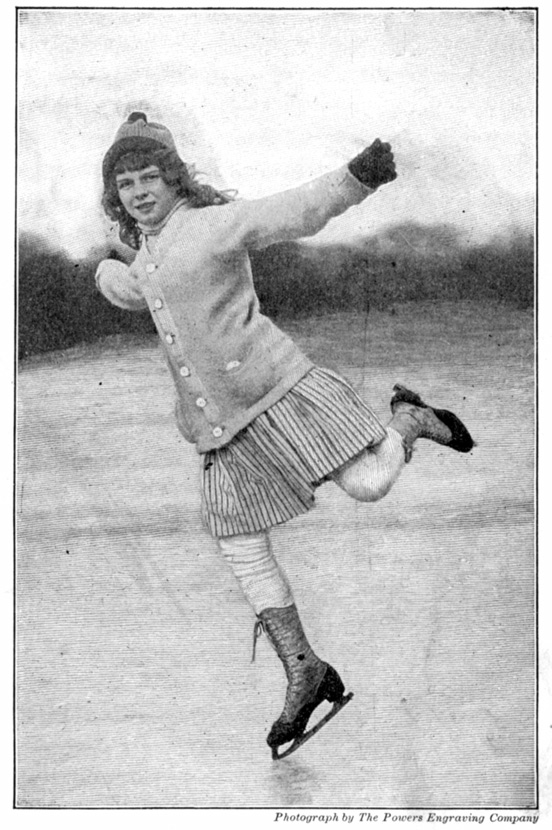
A GOOD SPORT FOR GIRLS AND BOYS
The Project Gutenberg EBook of The Child's Day, by Woods Hutchinson This eBook is for the use of anyone anywhere at no cost and with almost no restrictions whatsoever. You may copy it, give it away or re-use it under the terms of the Project Gutenberg License included with this eBook or online at www.gutenberg.org Title: The Child's Day Author: Woods Hutchinson Release Date: June 11, 2006 [EBook #18559] Language: English Character set encoding: ASCII *** START OF THIS PROJECT GUTENBERG EBOOK THE CHILD'S DAY *** Produced by Barbara Tozier, Bill Tozier and the Online Distributed Proofreading Team at http://www.pgdp.net

A GOOD SPORT FOR GIRLS AND BOYS
BY
Sometime Professor of Anatomy, University of Iowa; Professor of Comparative Pathology and Methods of Science Teaching, University of Buffalo; Lecturer, London Medical Graduates’ College and University of London; and State Health Officer of Oregon. Author of “Preventable Diseases,” “Conquest of Consumption,” “Instinct and Health,” and “A Handbook of Health.”
HOUGHTON MIFFLIN COMPANY
BOSTON NEW YORK CHICAGO
COPYRIGHT, 1912, BY WOODS HUTCHINSON
“If youth only knew, if old age only could!” lamented the philosopher. What is the use, say some, of putting ideas about disease into children’s heads and making them fussy about their health and anxious before their time?
Precisely because ideas about disease are far less hurtful than disease itself, and because the period for richest returns from sensible living is childhood—and the earlier the better.
It is abundantly worth while to teach a child how to protect his health and build up his strength; too many of us only begin to take thought of our health when it is too late to do us much good. Almost everything is possible in childhood. The heaviest life handicaps can be fed and played and trained out of existence in a child. Even the most rudimentary knowledge, the simplest and crudest of precautions, in childhood may make all the difference between misery and happiness, success and failure in life.
Our greatest asset for healthful living is that most of the unspoiled instincts, the primitive likes and dislikes, of the child point in the right direction. There is no need to tell children to eat, to play, to sleep, to swim; all that is needed is to point out why they like to do these things, where to stop, what risks to avoid. The simplest and most natural method of doing this has seemed to be that of a sketch of the usual course and activities of a Child’s Day, with a running commentary of explanation, and such outlines of our bodily structure and needs as are required to make clear why such and such a course is advisable and such another inadvisable. The greatest problem has been how to reach and hold the interest of the child; and the lion’s share of such success as may have been achieved in this regard is due to the coöperation of my sister, Professor Mabel Hutchinson Douglas of Whittier College, California.
The Author.
If there is anything that we all enjoy, it is waking up on a bright spring morning and seeing the sunlight pouring into the room. You all know the poem beginning,—
“I remember, I remember
The house where I was born;
The little window where the sun
Came peeping in at morn.”
You are feeling fresh and rested and happy after your good night’s sleep and you are eager to be up and out among the birds and the flowers.
You are perfectly right in being glad to say “Good morning” to the sun, for he is one of the best friends you have. Doesn’t he make the flowers blossom, and the trees grow? And he makes the apples redden, too, and the wheat-ears fill out, and the potatoes grow under the ground, and the peas and beans and melons and 2strawberries and raspberries above it. All these things that feed you and keep you healthy are grown by the heat of the sun. So if it were not for the sunlight we should all starve to death.
While sunlight is pouring down from the sun to the earth, it is warming and cleaning the air, burning up any poisonous gases, or germs, that may be in it. By heating the air, it starts it to rising. If you will watch, you can see the air shimmering and rising from an open field on a broiling summer day, or wavering and rushing upward from a hot stove or an open register in winter. Hold a little feather fluff or blow a puff of flour above a hot stove, and it will go sailing up toward the ceiling. As the heated air rises, the cooler air around rushes in to fill the place that it has left, and the outdoor “drafts” are made that we call winds.
These winds keep the air moving about in all directions constantly, like water in a boiling pot, and in this way keep it fresh and pure and clean. If it were not for this, the air would become foul and damp and stagnant, like the water in a ditch or marshy pool. So the Sun God, as our ancestors in the Far East used to call him thousands of years ago, not only gives us our food to eat, but keeps the air fit for us to breathe.
3In still another way the sun is one of our best friends; for his rays have the wonderful power, not only of causing plants that supply us with food—the Green Plants, as we call them—to grow and flourish, but at the same time of withering and killing certain plants that do us harm. These plants—the Colorless Plants, we may call them—are the molds, the fungi, and the bacteria, or germs. You know how a pair of boots put away in a dark, damp closet, or left down in the cellar, will become covered all over with a coating of gray mold. Mold grows rapidly in the dark. Just so, these other Colorless Plants, which include most of our disease germs, grow and flourish in the dark, and are killed by sunlight. That is why no house, or room, is fit to live in, into which the sunlight does not pour freely sometime during the day. The more sunlight you can bring into your bedrooms and your playrooms and your schoolrooms, except during the heat of the day in the summer time, the better they will be. The Italians have a very shrewd and true old proverb about houses and light: “Where the sunlight never comes, the doctor often does.”
So you see that Nature is guiding you in the right direction when she makes you love and 4delight in the bright, warm, golden sunlight; for it is one of the very best friends that you have—indeed, you couldn’t possibly live without it.
In one sense, in fact, though this may be a little harder for you to understand, you are sunlight yourselves; for the power in your muscles and nerves that makes you able to jump and dance and sing and laugh and breathe is the sunlight which you have eaten in bread and apples and potatoes, and which the plants had drunk in through their leaves in the long, sunny days of spring and summer.
So throw up your blinds and open your windows wide to the sunlight every morning; and let the sunlight pour in all day long, except only while you are reading or studying—when the dazzling light may hurt your eyes—and for six or seven of the hottest hours of the day in summer time. Perhaps your mothers will object that the sunlight will fade the carpets, or spoil the furniture; but it will put far more color into your faces than it will take out of the carpets. If you are given the choice of a bedroom, choose a room that faces south or southeast or southwest, never toward the north.
When you are really awake and have had a good look to see what kind of morning it is, you will feel like yawning and stretching, and rubbing your eyes four or five times, before you jump out of bed; and it is a good plan to take plenty of time to do this, unless you are already late for breakfast or school. It starts your heart to beating and your lungs to breathing faster; and it limbers your muscles, so that you are ready for the harder work they must do as soon as you jump out of bed and begin to walk about and bathe and dress and run and play.
When you jump out of bed, throw back the covers and turn them over the foot of the bed, so that the air and the sunlight can get at every part of them and make them clean and fresh and sweet to cover you at night again. Though you may not know it, all night long, while you have been asleep, your skin has been at work cleaning and purifying your blood, pouring out gases and a watery vapor that we call perspiration, or sweat; and these impurities have been caught by the sheets and blankets. So after a bed has been slept in for four or five nights, if it has not been 6thrown well open in the morning, it begins to have a stuffy, foul, sourish smell. You can see from this why it is a bad thing to sleep with your head under the bedclothes, as people sometimes do, or even to pull the blankets up over your head, because you are frightened at something or are afraid that your ears will get cold. Your breath has poisonous gases in it, as well as your perspiration; and the two together make the air under the bedclothes very bad.
Now you are ready to wash and dress. But before you do this, it is a good thing to take off your nightdress, or turn it down to your waist and tie it there with the sleeves, and go through some good swinging and “windmill” movements with your arms and shoulders and back.
(1) Swing your arms round and round like the sails of a windmill; first both together, then one in one direction, and the other in the other.
(2) Hold your arms straight out in front of you, and swing them backward until the backs of your hands strike behind your back.
(3) Hold your arms straight out on each side, clench your fists, and then smartly bend your elbows so that you almost strike yourself on both shoulders, and repeat quickly twenty or thirty times.
7(4) Swing your arms, out full length, across your chest five or ten times.
(5) Swing forward and down with your arms stretched out, until the tips of your fingers touch the floor.
(6) Set your feet a little apart, swing forward and downward again, until your hands swing back between your ankles.
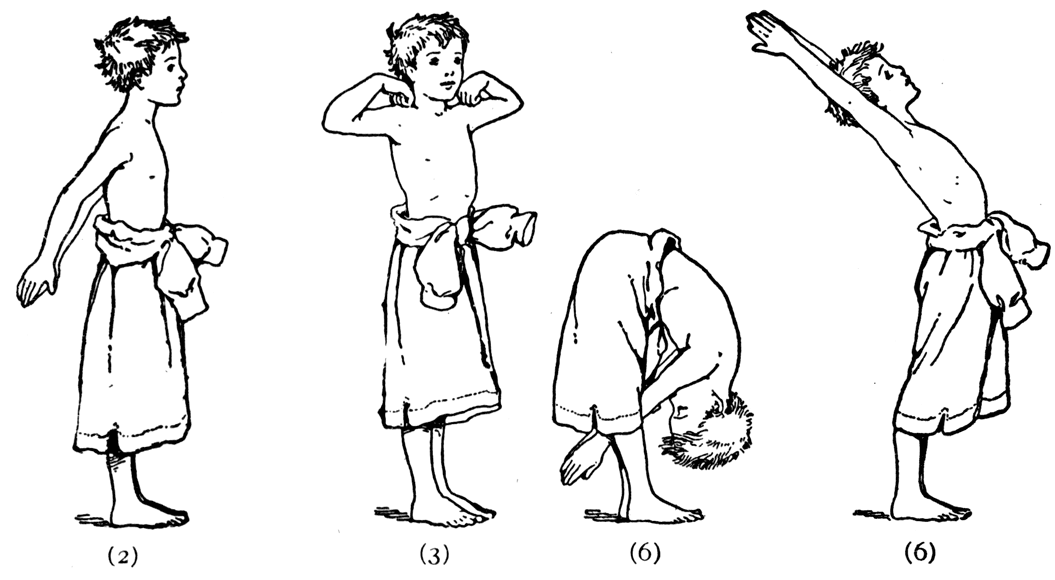
STARTING THE DAY
When you come back from these down-swings, bend just as far back as you can without losing your balance, so that you put all the muscles along the front of your body on the stretch; and then swing down again between your ankles. This will help to tone up all your muscles, and limber all your joints, and set your blood to circulating well, and give you a good start for the day.
Now you are ready to wash and dress. You can easily take off the gown, or garments, that you have worn during the night; but there is one coat that you cannot take off—one that is more important and useful and beautiful than all the rest of your clothes put together, no matter of how fine material they may be made, or what they have cost.
Do you remember the old Bible story about Joseph and his “coat of many colors”? Perhaps you’ve wished you had one just as nice. Now, the fact is, your coat is more beautiful even than Joseph’s; and, as for its uses, it is the most wonderful coat ever made!
This coat of yours changes its color from time to time; sometimes it is pink, sometimes red, sometimes a soft milky white, and sometimes a dull dark blue, or purple. I wonder if you guess what it is. Sometimes it is dry and sometimes wet, sometimes it is hot and sometimes cold, sometimes rough and sometimes smoother than the softest silk—just run your hand gently over your cheek!
Now you have guessed my riddle. This “wonderful coat” 9is your skin, which covers you from top to toe. It fits more closely than any glove, and yet is so easy and comfortable that it never rubs or binds or hurts you in any way.
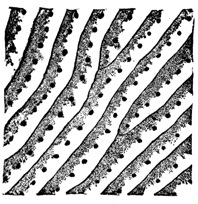
THE SKIN-STRAINER
The little pores open in furrows of the skin. This drawing is many hundred times as large as the piece of skin itself.
Will the wonderful coat wash? Yes, indeed, and look all the prettier. In fact, to keep it white and clear you must bathe often, not only your hands and face, but your whole body. Your skin is a strainer, you know. It is a “way out” for some of the gases and waste water from the blood. What will happen, then, if you don’t wash your skin? The little holes, or pores, that the sweat comes through may become clogged. The strainer won’t let the poison out, and so it will stay inside your body. Then, too, if you do not wash the skin, the little scales that are peeling off the outside coat will not be cleared away. You have noticed them, haven’t you, sometime when you were pulling off black stockings? You found little white pieces, almost as fine as powder, clinging to the inside of the stockings. These little scales are always rubbing off from your skin.
10So every morning it is good to splash the cool water all over yourself, if you can, as the birds do in the puddles. You don’t need a bathtub for this, though of course it is much pleasanter and more convenient if you have one. Pour the water into a basin and splash it with your hands all over your face, neck, chest, and arms. Then rub your skin well with a rough towel. Next, place the basin on the floor; put your feet into it and dash the water as quickly as you can over your legs. Then take another good rub. But you must not do this unless you keep warm while you are doing it, and your skin must be pink when you have finished. If you are chilly after rubbing, you should use tepid, even very hot, water for your morning bath. In summer you can bathe all over easily; but in winter, unless your room is warm, it is enough to splash the upper half of your body. Once or twice a week you should take a good hot bath with soap and then sponge down in cool water. See how the birds enjoy their bath; and you will, too, if you once get into the habit of bathing regularly.
Now let us take a good look at this coat and see if we can find out what it is like.
The other day I saw some boys playing basketball. They wore short sleeves and short trousers. 11Four were Indians, and five were white boys, and one was a negro. The skin of the white boys seemed to shine, it looked so white; and the negro’s shone in its blackness; but the Indian’s looked a dull rich dusky brown.
Yes, you say, they belong to different races.
But what causes the difference in their color?
Little specks of coloring matter, or pigment, which lie in the outer layer of the skin. Even white skins contain a little pigment, they are not a pure white. A Chinaman’s skin has a little more of this pigment, so that it looks yellow; an Indian’s has still more; and a negro’s has most of all, making him black.
Sunlight can increase the amount of pigment in the skin. The people who live in the torrid zone have much darker skins than those who live where the days are short and cold. You have noticed, yourself, that when you expose the skin of your face or arms to the hot sun, you become freckled, or tanned. This tanning, or browning, of the outer layer of the skin protects the more delicate coats of skin below from being scorched or injured by the strong light.
When you are playing and running with your schoolmates, you see that their faces grow very red, and even their hands. Why is this? Because 12the heart has been pumping hard and has sent the red blood out toward the skin. The red color shines through the outer part of the skin. The pigment in the Indian’s skin, or the negro’s, prevents the red blood underneath from shining through, as it does through yours.
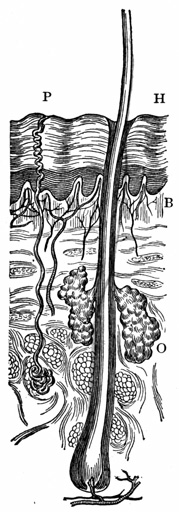
THE PARTS OF THE SKIN
The pore P on the surface of the skin is the end of a tube through which sweat flows out. At O are the oil sacs that feed the hair H. At B are the little blood vessels that make the skin look pink.
The skin, you see, is made up of different layers. When you burn yourself, you can see a layer of skin stand out like a blister. It is white; but if the blister is broken, underneath you see the coat that is full of tiny blood vessels, so tiny and so close together that this whole coat looks red. The skin, like every other part of the body, is made up of tiny animal cells. In the outer coat they become quite flat like little scales and then wear off; and their places are taken by the newer cells that are growing from beneath. The skin grows from beneath, and bit by bit it sheds its old outer coat. This is how it keeps itself nice and new on 13the outside and “grows away” the marks of cuts and burns.
Now hold up your hand and look across it toward the light. What do you see? It looks fuzzy, doesn’t it? Ever and ever so many tiny little hairs are on it. The other day a little boy asked me what made his skin look so rough? I looked, and saw that all the little hairs were standing on end, so that his skin looked like “goose-flesh.” It was because he was cold. The muscles at the roots of the hairs had shortened, so that they pulled the hairs straight up and made the skin look rough.
What part of the body has a great deal of hair on it? The head, of course. Isn’t it strange that you have such long hair on the top of your head and none at all on the soles of your feet or the palms of your hands? The hair on your head protects you from cold and rain and the hot sun; but hair on your palms, would only be in the way.
Now look at the ends of your fingers. There the skin has grown so hard that it forms nails. If you look at your toes, you will see that the same thing has happened there. These nails are little pink shells to protect the ends of your fingers and toes. You see what a wonderful coat it is that you are wearing.
14Does the skin coat keep you warm? Yes, and not only that, but it keeps you cool, too. You have often seen little drops of water on your skin, when you were very hot. This sweat, or perspiration, as we call it, cools the body by making the skin moist. You know how cold it makes you to be wrapped in a wet sheet. Well, the skin cools you in just the same way, when it becomes wet with sweat. The sweat comes from the blood under the skin; so that, as we saw before, by letting this moisture pass through, the skin acts as a sieve to let out the waste from the blood.
Then, too, the skin covers and protects all the other parts. It is thin where it needs to be thin, so as not to interfere with quick movements, as on the eyelids and the lips; and thick where it needs to be thick, to stand wear and tear, as on the soles of the feet and the palms of the hands. I remember once taking a sliver of shingle out of the back of a little boy who had been sliding down a roof. I had to sharpen my knife and press and push and at last get a pair of scissors to cut out the sliver. It was just like cutting tough leather. But even if we do sometimes get cuts and burns and bruises, yet our skin coat protects us far more than we really think. It keeps out all sorts of 15poisons and the germs of blood-poisoning and such diseases. These enemies can attack us only through a scratch or cut in the skin, for that is the only way they can get into the blood. The skin is better than any manufactured coat, too, because, if it is torn or scratched, it can mend itself.
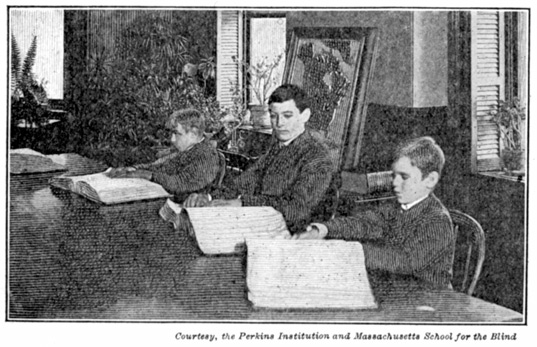
READING BY TOUCH INSTEAD OF SIGHT
These boys are blind; their books are printed with raised letters, which they read by feeling of them.
Does your skin ever talk to you? No, of course not; yet it tells you ever so many things. Shut your eyes and pick up a pencil. As you touch it, your skin tells you that it is round and smooth, and pointed at one end. You can feel the soft rubber on the other end, too. Is it wet? No. Is it hot? Of course not. Now place a book in the 16palm of your hand. Is it flat or round, light or heavy, rough or smooth? All these things your skin tells you through little nerve tips, which are scattered thickly all over it. Still another thing the skin does; if you touch anything sharp or hot, it says at once that it hurts. If your clothes are tight or uncomfortable, the skin soon lets you know. You see it is always on the lookout, always ready to tell you about the things around you and to warn you against the things that might hurt you. The fifth of your “Five Senses,” the sense of touch, is in your skin.
There are some parts of your skin-coat that should have special care.
I hardly need tell you about washing your face carefully around your nose and in front of your ears. Sometimes I have seen a “high-water mark” right down the middle of the cheek or just under the jaws or chin.
Of course your mother has told you about washing your hands! You see, our hands touch so many dirty things, and handle so many things that other people’s hands have touched, that we ought always to wash them before a meal for fear some of the dirt or germs on them may get into our mouths and cause disease.
And we really need to clean our nails as often 17as we wash our hands, for that little black rim under the nail is very dangerous. Dust and disease germs and dirt of all kinds find it a good place in which to hide. Trim your nails with a file, not a knife; and clean them with a dull cleaner, for a sharp-pointed one will scrape the nail and roughen it, or push the nail away from the skin of the finger underneath.
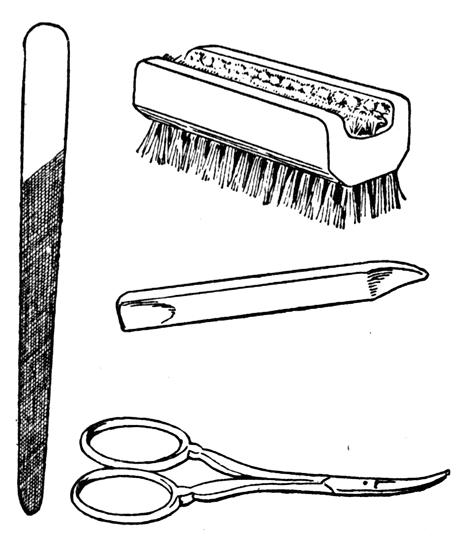
USEFUL TOOLS
Trim and clean the edges of your nails carefully and thoroughly, but don’t fuss much with the roots of them. That little fold of skin there may strike you as untidy, but it covers the soft growing part of the nail; and if you push it back with a nail-cleaner, it may cause the nail to crack and roughen or become inflamed and start a “hang nail” or “run around.” If you push it back at all, do so only with the ball of your thumb or finger.
The edges of the nails should be trimmed in a curve to match the curve of the end of the finger. Of course you know that you should never bite your nails, not only because it is a bad habit and will bring a good deal of dirt into your mouth, 18but because you may bite, or tear down into, the tender growing part of the nail, sometimes called the quick; and then this part may become inflamed, and you will have a troublesome sore on the end of your finger.
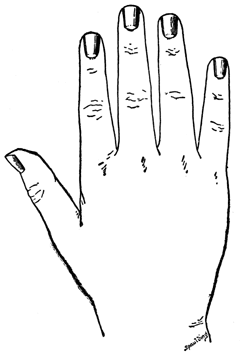
DO YOUR NAILS LOOK LIKE THESE?
Just as your nails are a part of your skin,—hardened from it and rooted in it,—so, too, are your teeth; and, like the rest of the skin, they should be kept thoroughly clean. Every morning and evening at least they should be carefully brushed. If you take good care of your first teeth and have them filled when they need it, you will probably have good permanent teeth, and you won’t have to suffer with toothache.
The skin of your head, which grows such beautiful hair, and the hair itself, should be kept clean. There are two things needed for this.
First, the hair should be brushed and combed night and morning. The skin of your scalp is shedding tiny thin scales all day and all night, just as the rest of your skin is doing. Fortunately, 19your hair is growing from roots under the skin much in the same way as blades of grass grow from their roots; and, as it grows, it pushes up these scales from the surface of the scalp to where you can readily reach them with a good bristle brush. If they are not well brushed out, the dust and smoke from the air will mix with them, and the germs in the dust and smoke will breed in the mixture, and you will soon have “scurf” or dandruff on your head. So give at least fifteen or twenty strokes with the brush before you use the comb. It isn’t necessary to brush or scrape the scalp, and a comb should be used only to part the hair or take out the tangles.
The second thing is to wash the hair and the scalp. Boys ought to wash their hair every week; and girls, every two weeks; and girls, especially, should be careful to dry their hair very thoroughly afterwards. You will notice after washing your hair that it feels dry and fluffy, and sometimes rather harsh. This is because the soap and hot water together have washed out of the hair its natural oil, or grease, which kept it bright and soft; and this is why it is better not to wash the hair with soap and hot water oftener than once a week or so. But it shouldn’t be shirked 20when the time does come. Watch how hard your kitten works to keep her fur coat glossy, though it must be tiresome enough to lick, lick, lick.
Sometimes in cold weather your lips and knuckles crack and bleed. That is because the skin on those parts is so thin and so often stretched and bruised. If you will take a little pure olive oil or cold cream and rub it on your lips and hands, it will make the skin softer and not so likely to break.
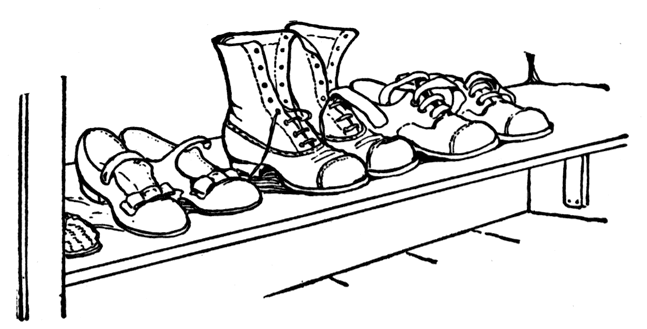
SHOES THAT SHOW SENSE
Low heels and plenty of room for the toes.
Sometimes your feet tell you that they need better care. Perhaps your shoes are too tight, or too loose and rub your toes. Soon the skin becomes very hard in one spot, and you have a “corn” on your toe. You must be very, very careful how your shoes and stockings fit. If you should find a corn, or the beginning of one, you had better tell your mother about it, and let her see that your stockings are not too big, so that they wrinkle into folds and chafe, or that your shoes are mended, or that you have a larger pair. And then, if you wash your feet in cold water every day, and put some vaseline or 21sweet oil on the hard spot night or morning, the corn will probably go away.
Not only your shoes, but all of your clothing must be comfortable if your skin and the parts under it are to do their work well. Your clothes as well as your skin must be washed often, because the sweat, which is oily and greasy as well as watery, soaks into them, and the little white scales cling to them, and often dust and disease germs, too.
One winter a little boy came to my school. The other children told me they did not like to sit by him, his clothes had such an unpleasant smell. I talked to him about it, and what do you suppose he said! “Why, I can’t bathe; the creek’s too cold in winter.” He was waiting till summer time to take a bath! No wonder the other children did not like to sit near him.
Yet, with all the bathing and rubbing and brushing, your skin won’t be clean and beautiful and able to do all that it has to do, unless your stomach and heart and lungs are in good working order. So you must eat good food, sleep ten or twelve hours a day, and play out of doors a great deal, if you expect your skin to be healthy.
When you are washed, it doesn’t take you long to dress; and before you have finished brushing your hair, you begin to feel as if you were ready for breakfast. You know just where the feeling is—an empty sensation near the pit of your stomach, and you don’t have to look at the clock to know that it is breakfast time.
About this time something begins to smell very good downstairs; and down you go, two steps at a time, and out into the dining-room, or kitchen. You could do it with your eyes shut, just following your nose; and it is a pretty good guide to follow, too. If you will just go toward the things that smell good, and keep away from, or refuse to eat, those that smell bad, you will avoid a great many dangers, not only to your stomach, but to your general health; for a bad smell is one of Nature’s “black marks,” and you know what they are.
How nice and fresh and appetizing everything looks—the white cloth, the clean cups and saucers, and the shining spoons and forks. You are sure that a good breakfast is one of the best 23things in the world. You sit down and begin to eat, and everything tastes as good as it looks.
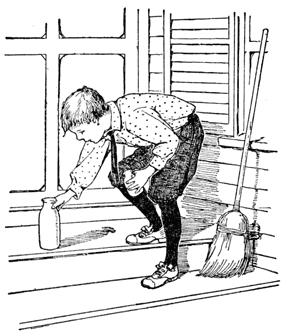
MILK AND SUNLIGHT DON’T AGREE
The early riser can help a great deal by taking the milk bottles in out of the sun. Milk spoils quickly if it is not kept cool.
A good breakfast would be an egg, or a slice of bacon or ham, with a glass of milk,—or two, if you can drink another,—and two or three slices of bread, or toast, with plenty of butter; and then some cereal with plenty of cream and sugar, or some fruit, to finish with. A breakfast like this will give you just about the right amount of strength for the morning’s work. Don’t begin with a cereal or breakfast food; for this will spoil your appetite for your real breakfast. Cereal has very little nourishment in proportion to its bulk and the way it “fills you up.” Bread or mush or potato alone is not enough. Any one of these gives you fuel, to be sure; but it gives you very little with which to build up your body. For that you must have milk or meat or eggs or fish.
It is most important that children should eat 24a good big breakfast. All the hundred-and-one things that you are going to do during the day—racing, jumping, shouting, studying—require strength to do; and that strength can be got only out of the power in your food, which is really, you remember, the sunlight stored up in it.
Sometimes, when you come down in the morning, especially if you haven’t had the windows of your bedroom well open so as to get plenty of air during the night, you may feel that you are not very hungry for breakfast. Or perhaps, if you have risen late, or are in a great hurry to get to school in time, you just swallow a cup of coffee or tea, and a cracker or a little piece of bread, or a small saucer of cereal. This is a very bad thing to do, because coffee and tea, while they make you feel warm and comfortable inside, have very little “strength,” or food value, in them, and simply warm you up and stir up your nerves without doing you any real good at all. A cracker or a single piece of bread or one large saucer of cereal has only about one fourth of the strength in it that you will need for playing or studying until noontime. So after you have started to school with a breakfast like this, about the middle of the morning you begin to feel tired and empty and cross, and wonder what is the matter with yourself.
25Children of your age are growing so fast that they need plenty of good, wholesome food. They get so hungry that they want to be eating all the time. For “grown-ups” three times a day is enough; but for you children, whose bodies use up the food so fast, it is well to take also a piece of bread and butter, or two or three cookies, or a glass of milk with some crackers, in the middle of the morning and again about the middle of the afternoon. It will not hurt your appetite for dinner or supper, and you won’t be wanting to “pick” at cake and candy and pickles all day long.
How does eating keep you alive and make you grow? Eating is somewhat like mending a fire. You put wood or coal on the fire, and it keeps burning and giving out heat; but if you do not put fresh fuel on, the fire soon goes out. Just so, putting food into your body feeds the “body fires” and keeps you warm, and at the same time makes you grow. Of course the “body fires” are not just like those you see burning in the stove: there are no flames. But there is burning going on, just the same.
The food you put into your body must be made soft and pulpy before it can burn in your muscles. Now you can guess what your teeth are 26for. They chop, crush, and grind the food; and the tongue rolls it over and over and mixes it with the moisture in your mouth, until it is almost like very thick soup. Then you make a little motion with your tongue and throat, and down it goes.
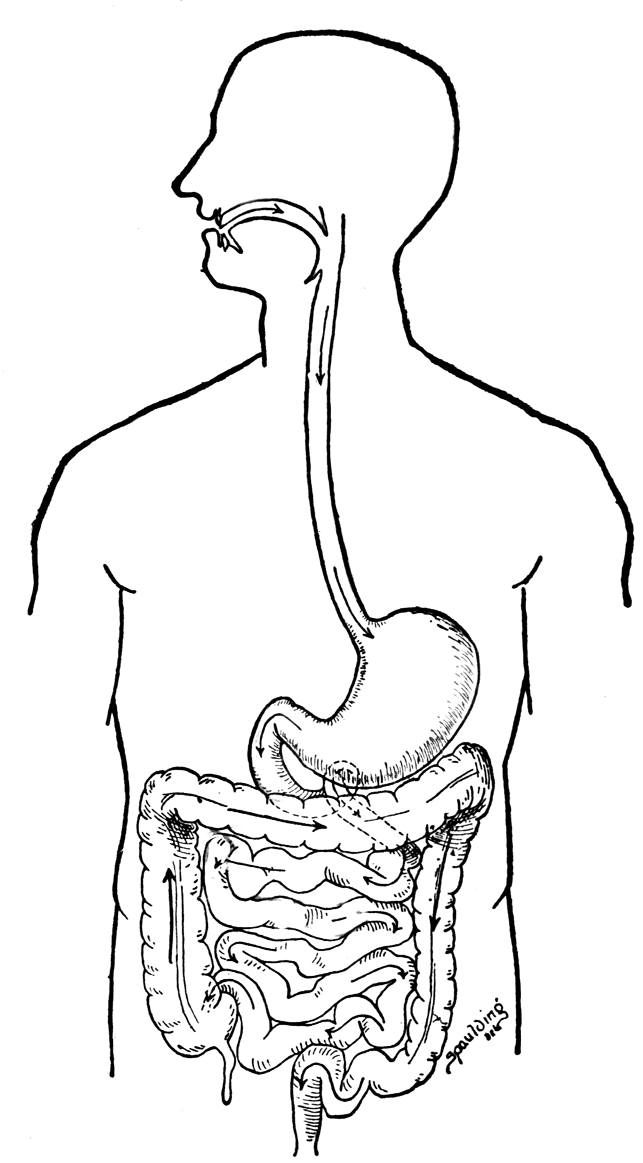
THE FOOD TUBE
Note the arrows. This is the trip made by every mouthful of food.
Where does it go? It is passed down a tube that we call the food tube. While I tell you about it, you can look at the picture and then try to draw it yourself.
The food goes quickly down the first part of the tube until it comes to a part much larger than the rest, which we call the stomach. Here it is churned about for a long time, and the meat you have eaten is melted, or dissolved. Then the food goes 27on into the next part of the tube, which has become narrow again. This lower part, which is about twenty-five feet long, is coiled up just below the waist, between the large bones that you can feel on each side of your body. These coils of the food tube, we call the bowels.
Winding all around the stomach and bowels are tiny branching pipes full of blood. They look somewhat like the creepers on ivy, or the tendrils on grapevines. These suck out the melted food from the bowels. They take what the body can use, and carry it away in the blood to all parts of the body. This is the fuel that keeps the “body fires” going. The tougher parts of the food, which the body cannot use, are carried down to the lower end of the bowels and pushed out by strong muscles.
This waste should be passed out from the body once every day and at the same time each day. In the morning after breakfast is perhaps the best time. If you do not get rid of it every day, it makes poisons, which go into your blood and soon make you very sick indeed. You must keep clean inside as well as outside.
As soon as you have finished breakfast, and brushed your teeth and gone to the toilet, you are ready to run out of doors to play, if you have plenty of time, or, if not, to start for school.
Doesn’t it seem a nuisance, in winter time, to have to put on a coat and overshoes and a cap or a hood, and sometimes leggings and mittens, too? But your mothers know what is best for you; and when you are young and growing fast, you have so much more surface in proportion to your weight than when you are grown up, that you lose heat from the blood in your skin very fast; and unless you are warmly dressed, you become chilled.
When you are chilled, you are using up, in merely trying to keep yourself warm, some of the energy that ought to be used for growing and for working. It has been found out by careful tests that children who are not warmly dressed, and particularly whose arms and legs are not warmly covered, do not grow so fast as they ought to, and more easily catch colds and other 29infections. So take time to put on your cap and your coat, if the weather is cold; and, if it is snowy, to button on leggings over your stockings; and then you can play as hard as you like, and run through the snow, and keep warm and rosy and comfortable.
Wool is one of the best stuffs for coats and dresses and stockings and gloves and caps, not only because it is warm, but also because it is lighter in weight than anything else you could wear that would be equally warm, and because it is porous; that is, it will let the air pass through it, and the perspiration from the body escape through it.
Don’t wear any clothes so tight that you cannot run and jump and play and fling your arms and legs about freely, or so fine and stylish that you are afraid of getting them soiled by romping and tumbling.
It is best to wear fairly heavy, comfortable shoes with good thick soles; then you will not have to wear rubbers, except when it is actually pouring rain, or when there is melting snow or slush upon the ground. Felt, or buckskin, or heavy cloth makes very good “uppers” for children’s shoes; but only leather makes good soles.
30It is best not to wear rubbers too much, because the same waterproofness, which keeps the rain and the snow out, keeps the perspiration of your feet in, and is likely to make them damp. When they are damp, they are as easily chilled as if they had been wet through with rain or puddle water. Always take off your rubbers in the house or in school, because they are holding in not only the water of perspiration, but the poisons as well; and these will poison your entire blood, so that you soon have a headache and feel generally uncomfortable.
The minute you are outside the door, the fresh morning air strikes your face, and you draw four or five big breaths, as if you would like to fill yourself as full as you could hold. If you have had a good night’s sleep and a good breakfast, the very feel of the outdoor air will make you want to run and jump and shout and throw your arms about. This warms you up finely and gives you a good color; but if you keep it up long, you will notice that two things are happening: one, that you are breathing faster than you were before; the other, that your heart is beating harder and faster, so that you can almost feel it 31throbbing without putting your hand on your chest.
If you run too hard, or too far, you begin to be out of breath, and your heart thumps so hard that it almost hurts. What is your heart doing? It is pumping; it is trying to pump the blood fast out to your muscles to give them the strength to run with.
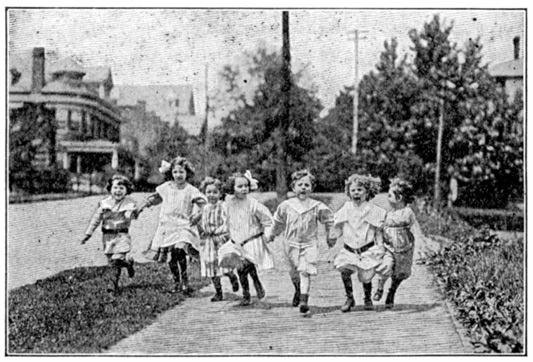
AN EARLY RUN IS A GOOD PREPARATION FOR THE DAY’S WORK
Of course you have seen a pump? Perhaps some of you have to pump water every day at home. You take the handle in your hands, lift it up, then press it down, and out pours the water through the spout; and, as you keep pumping, the water spurts out every time you press the 32handle down. It is hard work, and your arms are soon tired; but, as you cannot drink the water while it is down in the well, you must pump to bring it up where you can reach it.
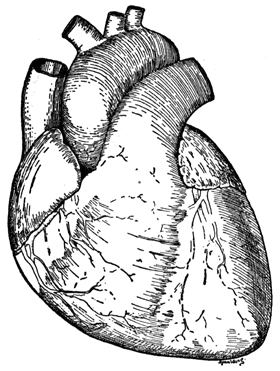
THE HEART-PUMP
The big tubes are the arteries and veins.
Just so the heart pumps to keep the blood flowing round and round, through the muscles and all over the body. If you put your finger on your wrist, or on the side of your neck, you can feel a little throb, or pulse, for every spurt from your heart-pump; and that means for every heart-beat.
This heart-pump is made of muscle, and is about the size of your clenched fist. And just as you can squeeze water from a sponge or out of a bulb-syringe, by opening and shutting your hand around it, so the big heart muscle squeezes the blood out of the heart. It squeezes it out from one side of the heart; and then, when it lets go, the blood comes rushing in from the other side to fill the heart 33again. So the heart goes on squeezing out and sucking in the blood, all day and all night as long as we live.
When the blood comes to the muscles, it is a beautiful bright red; but after the muscles have taken what they want of it for food to burn, and warm you up, the “ashes” and the “smoke” go back into the blood and dirty its color from red to purple. Then the blood is carried to the lungs, where the fresh air you breathe in blows away the “smoke” and makes the blood red again.
The blood is pumped all over the body through tubes or pipes, called blood vessels. Those that carry the red blood out from the heart, we call arteries. They are deep down under the skin, and we cannot see them. The pipes that carry the purple blood from the muscles and other parts back to the heart again, we call veins; and some of these are so close to the surface that we can easily see them through the skin. Let your hand hang down a minute or two, then you can see the veins on the inside of your wrist, or on the back of your hand, if it is not too fat.
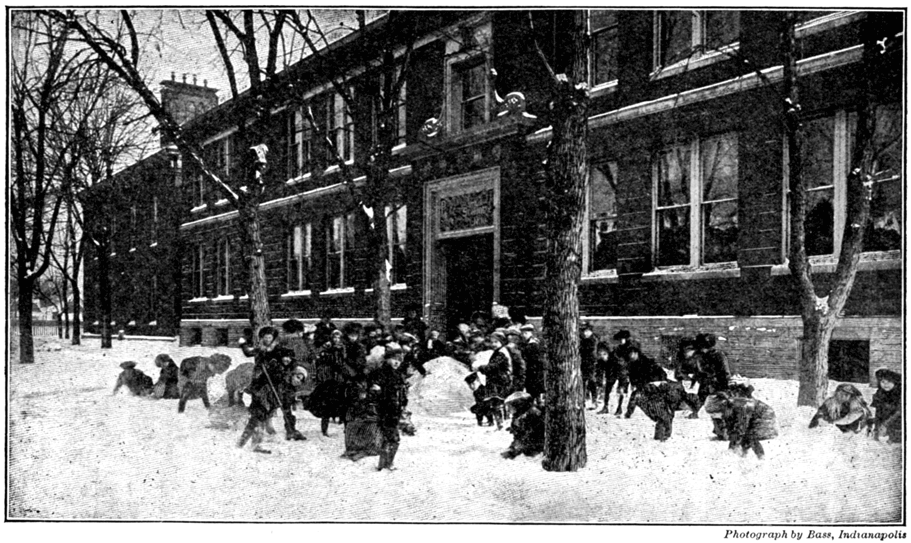
IT IS GOOD TO PLAY OUT OF DOORS TILL THE BELL RINGS—EVEN IN WINTER
The muscles, the brain, the skin, and other parts of the body get liquid food from the blood by “sucking” it through the walls of the smallest 35of the blood vessels, for these walls are very thin. In the same way, when waste passes from the muscles or the skin into the blood, it, too, soaks through the thin walls of the tiniest blood tubes, called capillaries.
Your heart beats or throbs about seventy-five times in a minute when you are well. Look at the second hand of a watch, while you count the beats in your wrist or in your neck.
Does your heart ever become tired? Not while you keep well, unless you over-drive it by running or wrestling too hard. It can rest between the beats. But the heart muscle, like any other muscle, must have plenty of good red blood to feed on. You put food into the blood by eating good breakfasts and dinners. The more you run and jump and play, the more work the heart has to do and the stronger it grows; and a good morning romp before school will send the blood flowing so merrily round from top to toe that you will feel fresher and brighter all the day.
The heart is not the only thing that goes faster and harder when you run about in the morning and play hard. You are breathing faster and deeper as well, as if there were something 36in the air outside that you needed in your body as much as food.
But, of course, you know that air is not good to eat. It has no strength in it, as food has; it isn’t even a liquid like milk or coffee or tea. It is so thin and light that we call it a gas. Indeed, I suppose it is pretty hard for you to believe that air is a real thing at all. But all outdoors is full of the gas called air, and everything that seems to be empty, like a room or an empty box, is full of it.
You cannot even smell it, as you can that other gas which comes through pipes into our houses and burns at the gas jets; nor can you see it like the gas that comes out of a boiling kettle or from the whistle of a locomotive, and which we call steam. This is simply because air is so pure that it has no smell, and is so perfectly clear that we can see right through it. Almost the only way that we can recognize it is by feeling it when it is moving. But it is a very real thing for all that; and, like sunshine and food, is one of the most important things in the world for us.
What is it that air does in the body? We must need it very much, for we die quickly when we cannot get it: it takes us only about three minutes to suffocate, or choke to death, if we can’t get it.
37You remember that the blood is pumped out from the heart, all through the body. Everywhere it goes,—to the feet and the hands and the head,—it is carrying two things: food that it has sucked up from the food tube, and hundreds and hundreds of tiny red sponges called red corpuscles. These little sponges are full of air which they sucked up as the blood passed through the lungs. When we stop breathing,—that is, taking in air,—the little red sponges of course can’t get any air to carry to the different parts of the body.
The body is made up of millions of tiny, tiny animals, called cells,—so tiny that they can be seen only under a microscope. Each of these cells must have food and air, just like any other animal. They eat the food the blood brings to them, and they take the air from the red corpuscles in the blood. With the air as a “draft,” they burn up the waste scraps, as we burn scraps from the kitchen, in the back of the stove.
Suppose you light a candle and place it under a glass jar and watch what will happen. The flame will become weaker and weaker, and at last it will quite go out. You might think at first that the wind blew it out; but how could the wind get through or under the jar? No, the glass keeps all 38the outside air away from the flame; and that is just the reason why it does go out. Unless it has fresh air, it cannot burn. There is something—a gas—in the air that makes the flame burn, and when it has used up all this gas inside the glass, and can’t get any more, it stops burning.
Now you will want to know what this gas in the air is. When we write about it, we use its nickname, the large capital letter O; but its whole name is Oxygen.
Just as the candle flame must have oxygen to keep it burning, so our cells must have oxygen to burn their impurities, or waste; and if they don’t get the oxygen, and can’t burn their impurities, they are poisoned by them and “go out,” or die.
You can see the flame when the candle is burning, but you can’t see the fires that burn in our bodies; there are no real flames at all. I know it is hard for you to believe that there can be any burning when our bodies are so wet and damp. But if you can’t see it, you can easily feel it. Blow on your hand. How warm your breath is! Touch your hand to your cheek. It is quite warm, too. If you run or play hard, you sometimes become so hot that you want to take off your coat. That is because your fires are burning 39faster. The muscles are using more food and making more scraps to be burned. You breathe faster and faster till at last you are “out of breath” and feel as if you would smother or choke. The blood has hard work to bring oxygen enough to keep the fires going.
After the cells have burned the food scraps, they turn the “ashes” and “smoke” back into the blood-stream that is always flowing past them. If the cells did not do this, they would soon smother to death, just as you could not possibly live in a house without chimneys to carry off the smoke. And, of course, the blood wants to get rid of this waste just as quickly as possible.
Part of the waste in the body is liquid, like water, and can flow away through the blood pipes without needing to be burned. Some of this watery waste comes out through the skin and stands in beads or drops upon it. That is the part we call perspiration, or sweat. The rest of it goes in the blood to another strainer called the kidneys, passes through this as urine, and is carried away from the body as the waste water from the bathtub and the sink is carried away from a house.
For the “smoke” Mother Nature has still 40another beautiful plan. She sends the blood-stream flowing through the lungs, where it can send off its “smoke” and then get fresh air to carry to the cells in the muscles. When you breathe out, you are sending out the “smoke”; and when you breathe in, you are taking in fresh air.
Our body “smoke” is not brown or blue, like the smoke from a fire; it is a clear, odorless gas, called carbon dioxid. This is the same gas that makes the choke-damp of coal mines, which suffocates the miners if the mine is not well ventilated; and the same gas that sometimes gathers at the bottom of a well, making it dangerous for anyone to go down into the well to clean it. And this gas is poisonous in our bodies just as it is in the mine or the well.
You see, then, how important it is that we should live much of our lives in the clear pure air out of doors, and should bring the fresh air into our houses and schools and shops. “Fill up” with it all you can on your way to school, for the best of air indoors is never half so good as the free-blowing breezes outside.
When you are running and breathing hard, and even when you are sitting still and breathing quietly, air is going into your lungs and then coming out, going in and coming out, many times every minute. How does the air get in and out of the lungs? It will not run in of itself; for it is light and floats about, you know. Here, again, Mother Nature has planned it all out. She has made us an air bellows, or air pump, to suck it into the lungs. First we’ll see what shape this pump is, and then how it works.
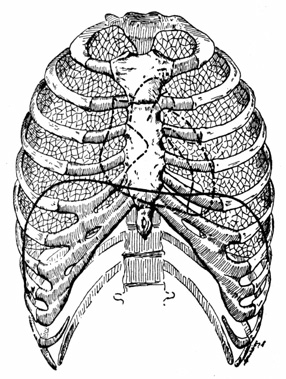
THE CHEST THAT HOLDS THE LUNGS
Back of the lungs is the heart; its position is shown by the broken line. The black line across the chest shows how high the diaphragm rises when we breathe out quietly.
Stiff rings of bone called ribs run round your body, just like the hoops in an old hoop skirt, or like the metal rings round a barrel. Here is a picture of the bones of the chest. Perhaps your teacher can show you the skeleton 42of some animal. You will notice how the rings, or ribs, slant and are joined by hinges behind to the backbone and in front to the breastbone. It looks somewhat like a cage, doesn’t it? Put your hands on the sides of your chest and you can feel your own ribs. Do they slant upward or downward?
This chest-cage is our breathing-machine. Before I tell you how it pumps, I want you to get a pair of bellows and see how they work. When you lift up the handle of the bellows, you make the bag of the bellows larger so that it sucks in air; and when you press the handle down again, the air puffs out through the nozzle.
Our air machine, though it is somewhat different from the bellows in shape, works in exactly the same way. You remember that you found that the ribs slant down and can be moved on hinges. Suppose, now, you place your hands against your ribs and feel the ribs lift as you draw in a long breath. The air will be sucked into your nose just as it was into the bellows when you raised the handle. By lifting your ribs, you have made the chest-cage larger; and the air has rushed into your nose, down your windpipe, and filled your lungs. If you breathe very deeply, you will find that your stomach, too, 43swells out. This shows that the muscular bottom of the cage, called the diaphragm, has been pulled down, making the cage larger still.
In this chest-cage are millions of tiny air bags that make up the lungs; and every time you take a breath, the air bags are puffed out with the fresh air that comes rushing in. By the time you let your ribs sink again, the air has given its oxygen to the blood, and the blood has poured its carbon-dioxid smoke into the air bags for you to breathe out. Nature, with the same bellows, pumps in the oxygen and pumps out the “smoke.”
Now, we breathe into our lung-bellows whatever air happens to be around us. So we should take care that the air around us is fresh air.
Unless the air were kept in motion by the heat of the sun, causing breezes and winds, it would become stale and wouldn’t do at all for our lung-bellows to use. The air we breathe must be kept moving and fresh if it is to make us feel bright and strong and happy. Mother Nature has given us miles upon miles and oceans upon oceans of this clear, fresh air to breathe—“all outdoors,” in fact, as far as we can see around us and for miles above our heads. She sends the winds to move the air about and blow away the dust and dirt; and the sunshine, you remember, not only 44to warm the air and keep it moving, but to burn right through it and kill the poisons. But this brings us to something else.
You have learned that the air we breathe out would soon smother us, just as smoke would; and now we will see why. If you blow against the window pane on a cold day, the glass is no longer clear; and when you look at it closely, you see that it is covered with tiny drops of water. This is part of the breath you have just blown out. If the room is cold enough, you can see your breath in the air; that is, the steam in your breath becomes cold and appears as tiny water-drops. You have seen how in the same way, the steam, an inch or so from the spout of the teakettle, cools, making little water-drops that float in the air like clouds. Part of the breath, then, is water; but most of it is a gas, and you can’t see it at all as it floats away into the air about you.
If your teacher has a glass of limewater, and will let you breathe into it through a tube, you will see that your breath soon makes the water look milky. This shows that the gas in your breath is not like the air about you; because air was all over the top of the limewater, yet did not change it at all. The milky look is caused 45by carbon dioxid, one of the poisons in your breath.
When some people come close to you, you want to turn away your head, because you do not like the smell of their breath. Even when one is quite well, the breath has a queer “mousey” odor, so that we never like to breathe the breath of another person. This disagreeable odor comes not only from the lungs but from the teeth.
We are always breathing out poisons into the air. One of these you can see in the milky limewater, and others you can smell when you happen to come close to anyone else.
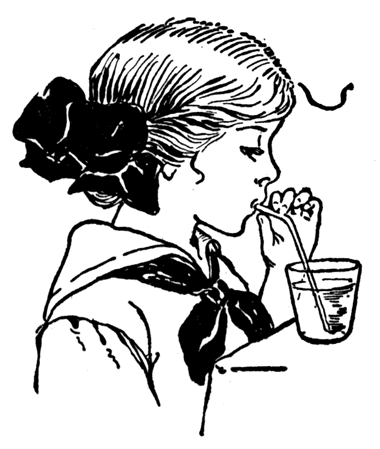
PROVING THAT THE BREATH IS NOT LIKE THE AIR
If you blow on your fingers, you feel that your breath is much warmer than the air. If people are crowded together in rooms with doors and windows shut, their breath soon heats and poisons the air, until they begin to have headache, and to feel dull and drowsy and uncomfortable. If they should be shut in too long, without any opening to let in the fresh air, as in a prison cell, or in the hold of a ship during a storm, the air would become so poisonous as to make them 46ill, and would even suffocate them and kill them outright. Even the bees found this out thousands of years ago; and in their hives in hot weather they station lines of worker-bees, one just behind another from the door right down each of the main passages, whose business it is to do nothing but keep their wings whirring rapidly, so that they fan a steady current of fresh air into every part of the hive.
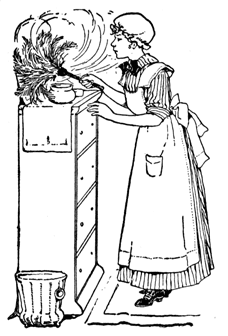
Breathing Dust.
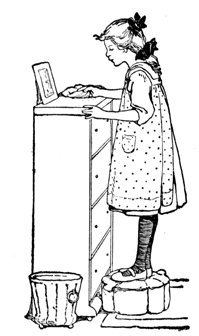
Catching the dust in a cloth.
DUSTING—HOW SHALL WE DO IT?
How does Mother Nature get rid of these poisons from our breath? Of course, you say, “She uses the wind and the sunshine.” Yes, the winds can whisk up the poison and blow it away so fast, and the sunshine can burn up the horrid 47smell so quickly, that even the air above big cities, and in their streets, is quite clean enough for us to breathe, except where the people are very closely crowded together and very dirty. Mother Nature wants all of us to help in keeping the air clean. This we can do by keeping ourselves and our houses clean, and by being careful not to leave scraps of waste, or dirty things, in the streets and cars and parks and other public places. And you children ought to be very careful about your school yard and the halls and the classrooms, where you spend so much of your time.
The only place where air is absolutely sure to be fresh is out of doors. There, as we have seen, the sun and the winds keep it so all the time. But, unluckily, we cannot spend all our time outdoors, either when we are little or after we have grown up. So we must try in every way that we can to bring the outdoors indoors—to get plenty of fresh air and light into the houses that we live in, especially the bedrooms we sleep in and the schoolrooms we study in when we are children, and the offices or shops we work in when we are grown up.
After you have your lungs and your blood well filled with air, either by walking briskly to school or by chasing one another about the school playground, you will suddenly hear the bell ring, and you march indoors and sit down at your desks. Here, of course, the air cannot blow about freely from every direction, because the walls and doors and windows are shutting you in on every side. The room, to be sure, is full of air; but if the doors and windows are shut, this air has no way 49of getting outside, nor can the fresh, pure air out of doors—even though it be moving quite fast, as a wind or a breeze—get inside.
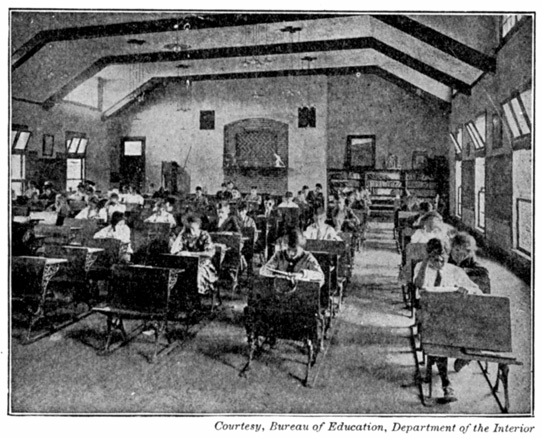
A CLASSROOM ALMOST AS GOOD AS THE OUT-OF-DOORS
Notice the windows open top and bottom, and the high windows under the roof. Why are these good?
We must let the fresh air come in and the stale air go out. This is one of the things that windows are for; and this is why they are hung upon pulleys and made to slide up and down easily. Of course, even when the windows are not open, they are letting in light, which, you remember, is a deadly enemy to germs and poisons.
50Bright sunlight is best for purifying the air of a room, but even ordinary daylight has a good deal of germ-killing power. Therefore, a room that is well lighted is not only much pleasanter to live in, but much healthier, than one that is dull and gloomy. You see why we need plenty of windows and doors: we must let in the breezes and the sunshine, and let out the poisons and the dirt. Then, too, we must make the air in the building move about in order to keep it fresh; for if the air is not fresh, we soon grow tired and sleepy and have headaches. That is why your teacher keeps the windows open at the top a foot or so. You can easily see that when there are twenty or thirty of you breathing out poisons, and each one of you needing about four bushels of fresh air every minute, the old air ought to be going out and the fresh air coming in all the time.
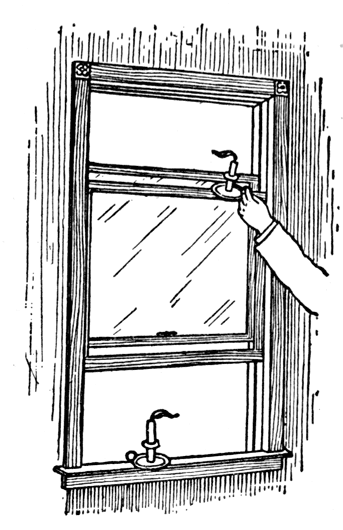
VENTILATION
Watch the candle flames. Which way is the air moving, and why?
That is also why your teacher gives you a recess, so that you can run out of doors and get some fresh air. Then she can throw open all the windows and doors and have the air in the room 51clean and fresh when you come back again. So when recess comes, don’t hang about in the hallways or on the stairs or in the basement, but run right out of doors into the playground and shout and throw your arms about and run races to fill your lungs full of fresh, sweet air and stretch all your muscles, after the confinement and sitting still. Don’t saunter about and whisper secrets or tell stories, but get up some lively game that doesn’t take long to play, such as tag or steal-sticks or soak-ball, or duck-on-a-rock or skipping or hopscotch. These will blow all the “smoke” out of your lungs and send the hot blood flying all over your body and make you as “fresh as a daisy” for your next lesson.
When you come back into the schoolroom after recess, the air will seem quite fresh and pure; but unless you keep the windows open, it will not be long before your head begins to be hot, and your eyes heavy, and you feel like yawning and stretching, and begin to wonder why the lessons are so long and tiresome. Then, if your teacher will throw open all the windows and have you stand up, or, better still, march around the room singing or go through some drill or calisthenic exercises, you will soon feel quite fresh and rested again.
52In the mild weather of the spring or early fall, all you need to do to keep the air fresh in the schoolroom is to keep the windows well open at the top. But in the winter, the air outdoors is so cold that it has to be heated before it is brought in; and this, in any modern and properly built schoolhouse, is usually arranged for. The fresh air is drawn in through an opening in the basement and is either heated, so that it rises, or is blown by fans all over the building. This sort of fresh air, however, is never quite so good as that which comes directly from outdoors; so it is generally best to keep at least two or three windows in each room opened at the top as well, and never to depend entirely upon the air that comes through the heating system.
Sometimes this may mean a little draft, or current of uncomfortably cool air, for one or two of you who sit nearest the windows; but your teacher will always allow you to change your seat if this proves very unpleasant. If you have plenty of warmth in the room you sit in, unless the air outside is very cold, this “breeze” won’t do you any harm at all; on the contrary, it will be good for you. Instead of catching cold from a draft like this, it is from foul, stuffy, poisonous air, loaded with other people’s breaths and 53the germs contained in them, that you catch cold.
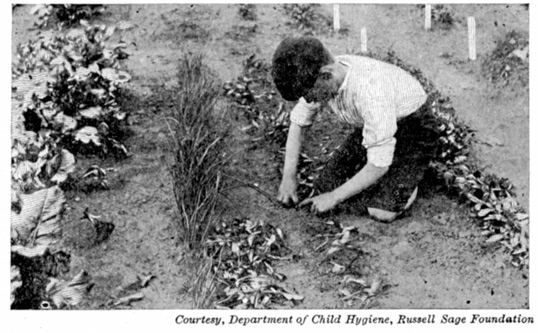
GARDENS TAKE US OUT OF DOORS
In fact, staying indoors is usually the reason why people are sick. They don’t go out into the clean fresh air for fear they’ll be too cold! It seems a pity we can’t just live out of doors all the time. Perhaps we shall some day; for doctors are finding out that fresh outdoor air and good food are the very best medicines known, and the only “Sure Cures.” They are pleasant to take, too. Many cities are providing outdoor schools for children who have weak lungs or are not strong in other ways. Perhaps some day all school children will be allowed to study in the open air at least part of every school day.
Now you are all ready to go to work. What are you going to work with? Books? pencils? paper? Yes, but you have something better than those and all ready for use. It is that little kit of tools that are sometimes called our “Five Senses.” You remember that we have already talked about one of them, the sense of touch in the skin. Now which one are you going to use first this morning? If your teacher talks to you, I hope it will be the one we call the sense of hearing. Suppose we try to find out something about this sense of hearing, and begin with a little experiment.
Take a piece of cork in your hand and lift it up high and then let it drop into a large basin or tub of water. What happens? The cork strikes and then goes bob-bob-bobbing up and down on its own waves. Now watch the little waves all around the cork. Where do they stop? They don’t stop until they touch the edge of the pan; and no matter how big the pan is, the waves go on and on until they reach the edge.
We can see these waves of water, and so we easily believe that they are there. Now there are, just as truly, waves of air all around us. We cannot see the waves, because they are too small 55and roll too quickly. But some of these, when they roll against our ears, make us hear. They make what we call sound. You have heard about sending messages through the air, without telegraph wires. Wireless messages are often sent to ships out in the middle of the ocean. This is done by starting tiny electric waves, which travel through the air much as the waves of water are traveling across the ocean beneath. Of course there must be a machine, called a receiver, to catch the waves and “hear” the message.
Mother Nature has given each of you two very delicate little receivers to catch the sound waves and carry them to your brain. You know what they are—you can name them. But how are these wonderful little machines made?
You have never seen the whole of your ear. The part on the outside of the head, of course, you can easily see and feel. Sometimes you notice a deaf person put his hand behind his ear and press it forward so as to catch the sound waves better. These waves roll in at the little hole you can see, and travel along a short passage till they come to a round drum, a piece of very thin skin stretched tight like a drumhead.
Have you ever beaten a drum with a stick? You felt the drumhead quiver under the blow, 56did you not? Well, when the sound waves beat against the drum in the ear, it quivers and starts little waves inside the ear. Each little wave in turn beats against a little bone called the hammer; the hammer beats against another called the anvil, and this against a third called the stirrup; and the quiver of the stirrup is passed on to a little window, opening into a little room with a spiral key-board; and from this, the wave travels along a nerve to the brain. As the waves reach the brain, the brain hears. In this way we hear all sorts of sounds, from the tick of a watch to the whistle of a train.
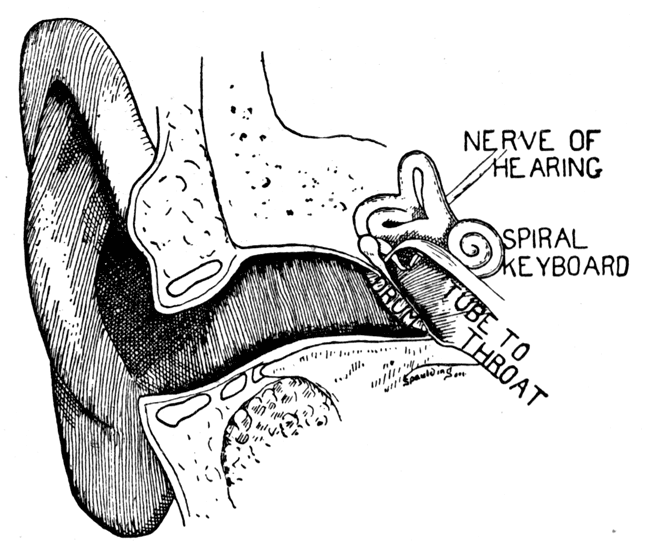
THE WAY BY WHICH SOUND WAVES REACH THE BRAIN
A section through the right ear.
There is a sensible old saying, “Never put anything smaller than your elbow into the inner part of your ear.” Now, of course, you can’t put your elbow into such a tiny hole! So the old saying means, never put anything in. The eardrum is very thin and can easily be broken. Even a slap on the ear, or a loud sound too close to it, 57might crack and spoil the drum and make one deaf.
The outside ear needs careful washing; there are so many little creases that gather dirt and dust. The deep crease behind the ear, too, will become sore if it is not kept clean.
Besides cleaning your ears, you must train them to listen. Some boys and girls hear just a word or two of what is said, and then guess at the rest and think they are listening, or else ask to have it repeated. We should try to hear exactly what is said; and if we listen carefully, it will soon be much easier to understand at once.
Of course, if you really cannot hear, the doctor can tell you what is the matter, and usually can help you very much. Sometimes people become deaf simply because the throat is swollen. Indeed, most deafness comes from colds and catarrhs and other inflammations of the nose and throat. These spread to the ear through a little tube that runs up to the drum cavity from the back of the throat. Sometimes, when you are blowing your nose, you may feel your ear go “pop”; and that means that you have blown air up into the ear through this little tube. Be sure to see a doctor if you don’t hear well; and be sure, too, to tell your teacher, so that she 58may know why it is you do not hear what she says, and ask her to give you a seat near her, so that you can hear.
Then, too, you should learn to notice outdoor sounds—the songs of the birds, the noises that the animals make, the wind in the trees, and the patter of the rain. The old Norsemen have a story that their god Heimdall had such keen ears that he could hear the grass growing in the meadow and the wool growing on the backs of the sheep! Your ears can never be so keen as that; but there are many, many happy outdoor sounds that you should listen for. They will help to make you happy, too.
Careful listening may sometime save your life. You can hear the car or the train coming, and you can learn to tell from which direction a sound comes. You can learn to tell one sound from another in the midst of many sounds. In more ways than you can think of now, this habit of listening will protect you from danger.
The Germans have a proverb, “Hear much and say little.” What does it mean?
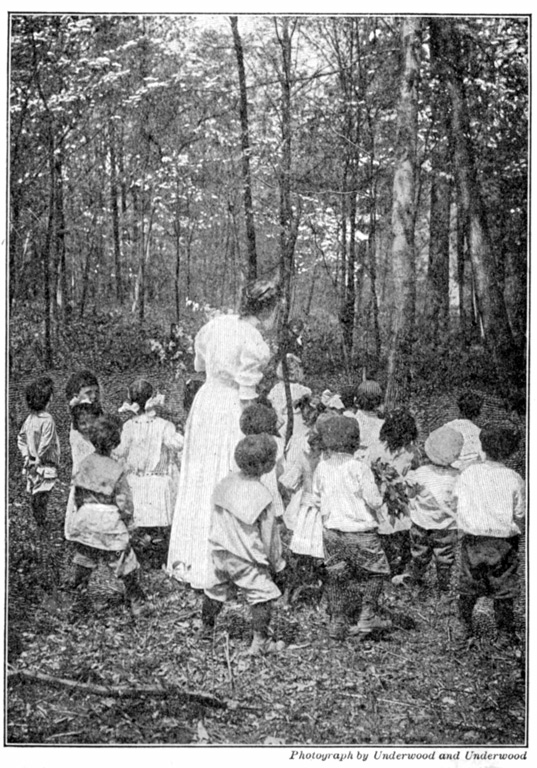
“DO YOU HEAR IT? CAN YOU SEE IT?”
You can learn a great deal through your ears, but think how much more you can learn through 60your eyes. Just count over all the things that you have had to get your eyes to tell you to-day, and then shut your eyes for a minute and think what it would mean never to be able to see. Don’t you think you ought to take very good care of your eyes? You are going to keep them very busy all your life, and they deserve the very best care you can give them.
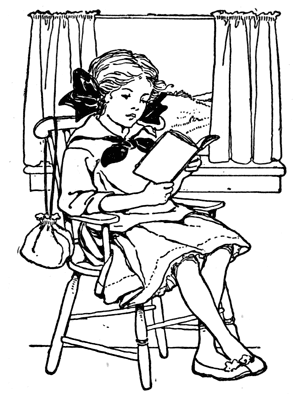
THE LIGHT ON THE PAGE, NOT IN THE EYES
Just as soon as lessons begin, you get out your books; and a good share of the day in school you have a book before you, reading it or studying it or copying from it. It makes a great difference to your eyes how you hold the book and how the light falls. In reading, you should always hold your book so that the light falls upon the page from behind you, or from over one of your shoulders. In this way, the brightest light that comes into your eyes is not from the window, but from the page of your book.
61If the light comes from a window in front of you, or if you sit in the evening with your face toward the lamp when you read, the light coming straight from the lamp or the window, as well as the light coming up from the pages of the book, pours into your eyes; and this dazzles and confuses your eyes, so that you can’t see plainly and comfortably and are very likely after a while to find that your head aches. At home, of course, you can seat yourself with your back to the light when you read; and usually at school your seats are so arranged that the light falls from behind you or from one side. If not, by turning a little in your seat, you can get the light from over your shoulder.
Notice how the light falls upon the blackboard. When the light comes from the windows behind you, or from one side, you can see what is written there quite plainly. But if the blackboard happens to be between two windows, and especially if this is the lightest side of the room, you will find that the light dazzles you so that you cannot see the writing clearly.
You must have noticed, too, that if, after you have been reading from the blackboard you look down again suddenly to the page of your book, for an instant you will not see the letters plainly. 62Then, almost before you have time to notice it, you feel a little change take place inside your eyes, and the print upon the page of your book becomes quite plain. This is because your eye has to change the shape of one of the parts inside it, called the lens, before you can see clearly the things that are near you. This change, which is called accommodation, is made by a little muscle of the eye; and if you keep your eyes working at close work, like reading or writing or fancy-work, too long at a time, or if your eyes need glasses to make them see clearly, and you haven’t them on, this little muscle becomes tired. Then the print of your book, or your writing, or the stitches you have taken begin to blur before your eyes. Your eyes begin to feel tired, and your head begins to ache. This is what we call eye strain.
Sometimes this eye strain upsets your appetite or your digestion and makes you sleepless and worried. The trouble may be caused by your own carelessness: you may have been reading too long, or in a poor light, or with the light shining right in your face instead of coming over your shoulder. But sometimes it is caused by the fact that your eyes are not just the right shape; and then the only way to relieve it is to have proper 63glasses, or spectacles, fitted, which will make up for this too flat or too round shape, or too large or too small size, of your eyes.
If you cannot see clearly what is written on the blackboard when the light falls upon it from behind you, or above; or if, in a good light, you cannot read the words in your book quite easily, without straining at all, when you hold the book either at arm’s length or a foot from your face; or if your head aches or your eyes begin to feel tired or uncomfortable, or the letters begin to blur, after you have read steadily—say, for half an hour,—it is a pretty sure sign that there is some trouble with your eyes. Then you had better have them examined at once by your family doctor or by the school doctor. In many schools now there are doctors to test the children’s eyes, and ears, too, so that each child may have a chance to see and hear everything that the other children can see and hear.
Not very many years ago people thought that glasses were only for old people, but now we know that many children’s eyes need glasses, too. I knew a little girl whose sight was so poor that when she was standing and looked down at the grass, she couldn’t see the green blades. She thought that the grass looked like a green blur 64to everyone, just as it did to her; and so she never said anything about it. She was twelve or thirteen years old before she found out that she couldn’t see clearly. Of course, trying hard to see things gave her a headache and made her tired and cross. So some one took her to a doctor, and he saw at once what was the matter and fitted her with glasses. Soon she was quite well and strong; and how glad she was to see the leaves and a hundred other things she had not seen before!
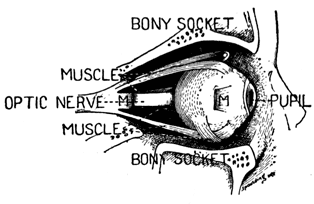
THE EYEBALL IN ITS SOCKET
The muscle from M to M, which helps to turn the eyeball, has been cut away to show the optic nerve.
Here we have a picture of the eyeball, as we call it. The little bands fastened to it are the bands of muscle; and as soon as I say muscle you know what they are for—to move the eyeball about, up and down and from side to side. There are muscles outside the eye as well as inside. Coming out from the back of the eyeball is a pearly white cord quite different from the muscle bands. This is what we call a nerve. This nerve in your eye carries to your brain, or 65thinking machine, picture-messages of whatever you look at.
The nerve in your eye gets messages of light much as the nerve deep in your ear gets its messages of sound—from tiny waves in the air. The light waves are smaller and faster even than the sound waves, and the eye nerve is the only nerve that can get pictures of them. You know that, for wireless messages, the receiving machines are not all alike and cannot all take the same messages, if the messages are sent with different sorts of electric waves; and neither can our receiving machines. Some get messages of sight, and some of sound, and some of touch, or taste, or smell.
Now shut your eyes as quickly as you can. How long did it take you? A minute? No, not a quarter of a second. It is about the quickest thing you can think of—“the twinkling of an eye.” You shut your eyes “quick as a wink” whenever anything seems likely to fly or splash into them, and this is what the eyelids are for. If anything gets into the eye before the lids can shut, the eye “waters,” and tears pour out of it. These are made by a gland-sponge up under the upper lid, so as to wash any dust or sand or other harmful speck out of the eye before it can hurt the sensitive eyeball.
66Now look at some one’s eyeball. It is like the picture, isn’t it?—bright white around the edge and then a ring of color, brown or blue or gray; and inside the color-ring, or iris, a little round black hole that we call the pupil. Watch the little hole change as you turn the face toward the window. It becomes ever so much smaller. Now turn the face away from the window, back again into the shadow. How did the pupil change this time?
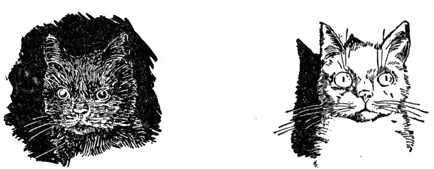
EYES PROTECT THEMSELVES AGAINST THE LIGHT
The iris, or color-ring, acts like a curtain, like the ring-shutter of a camera, and closes up the hole, or pupil, when the light is too bright and would dazzle or burn the inside of the eye; but when the light is dim, the iris opens again, so as to let in light enough with which to see. Look at the little window in your kitten’s eyes. It is not the same shape as yours; but when you carry her to the light, you see how the iris closes in and leaves just a little black slit or line.
67You remember the blind children? Isn’t it wonderful how they can play games and study, too, even though they are blind! They have to make their senses of touch and hearing tell them many things that you learn through your sense of sight. Many of these children need not have been blind, if the nurse who first took care of them when they were born had known enough to wash their eyes properly, not with soap and water, of course, but with just one or two drops of a kind of medicine—an antiseptic, as we call it—that makes the eye perfectly clean.
But you children who have good eyes that can see, do you really see things when you look at them? You can train your eyes just as you can train your ears. You can teach them to read quickly down a page, and to find things in pictures, and, better still, to see things out of doors, in the garden and the woods and on the seashore. We hear a great deal about “sharp eyes,” but most of us see very little of all we might see. Our eyes are on the lookout, too, to protect us from dangers that may come; with our skin and nose and ears, they are constantly on the watch; so the better we see the safer we are.
Even if your eyes are perfect now, you will need to take good care of them to keep them 68strong. Don’t let any story, no matter how interesting it is, tempt you to read in a dim light or a light that is too strong. And if you can’t see the blackboard easily, or can’t read big print, like the school calendar, across the room, tell your mother or your teacher, so that she can ask the doctor to find out what the matter is.
It is astonishing what thirsty work studying is! Scarcely is the second recitation over before your throat begins to feel dry, and up goes your hand—“May I get a drink?”
If anyone even says the word “water,” it makes you thirsty. It is so good that just the thought of it makes you want some. I should like you to notice how much water you drink every day. Perhaps a glass in the morning when you get up, and one at night before you go to bed, and three or four in between.
Why do we need so much water? Well, how much do you weigh? Perhaps you will find it hard to believe, but more than half of that weight is water; and because we are always giving off water from the skin and from the body, we need plenty more to take its place.
No living thing can grow without water. Take 69a bean, for instance, and put it in an empty glass on the window sill; and even if the sun shines full upon it, nothing will happen, except that after a few days it will shrivel and dry up. But fill the glass with water, and in a few hours the bean will begin to swell; and in a few days it will burst, and a little shoot will grow out of one end of it and a tiny root at the other. The water and the warmth together have made it sprout and grow.
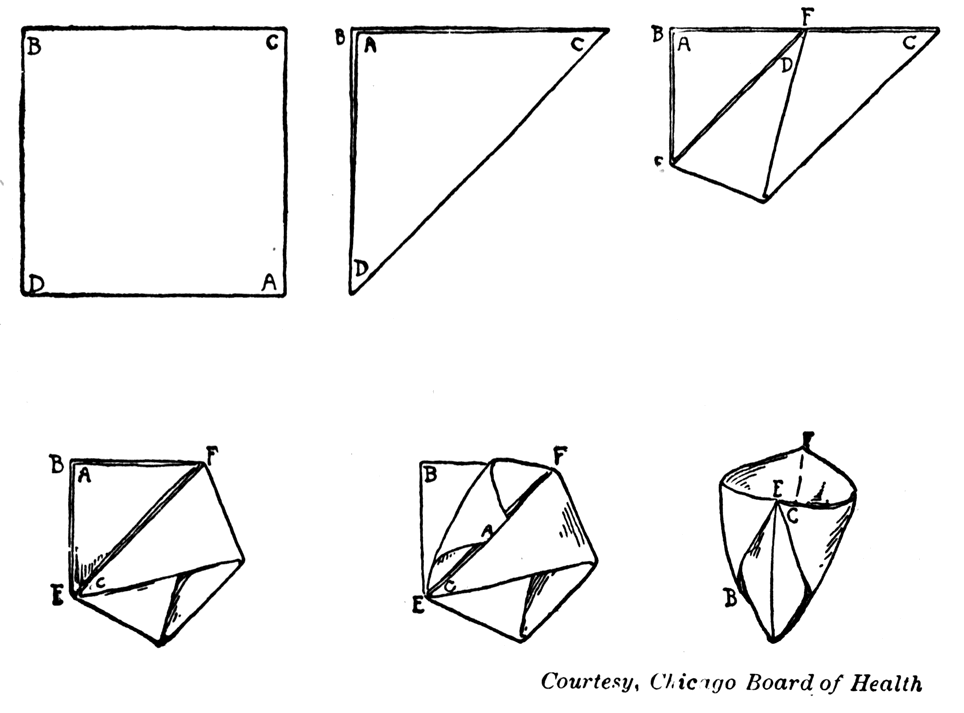
A DRINKING-CUP EASILY MADE
Children at school and people on trains should have their own private cups, for serious diseases may be caught from the mouths of other people. You can get a metal pocket folding cup for ten or fifteen cents, or paper ones for a few cents a 70dozen. If you don’t have your own cup, I hope you will get one and carry it. Here is a pattern for a paper cup that you can easily make for yourselves. Try it and see. When you have once learned how, you can make it very quickly and have a fresh cup every time you want one; but of course you should be sure first that the paper itself is clean.
If you drink milk, this takes the place of some of the water and gives you food as well. It is both drink and food; and a very good food for children it is, too. You know, babies can live on it because it has everything in it to make them grow.
Do you know why it is that people are so careful nowadays about having milk and drinking-water very clean? It is because they have found that the tiny plants, called germs, that make people sick are often carried about in these drinks. A disease called typhoid fever is carried in this way.
Fifty years ago, cities and towns used to be very careless about where they got their water supply, and would often take it out of streams into which other cities emptied their sewage. Now, however, they are much more particular; and the health officers, or Boards of Health, are insisting that public water supply, such as is 71brought into our houses in pipes, shall be taken either from some spring or deep-flowing well, or from a stream or lake up in the hills, into which no drainage from houses or farmyards, and no dirty water from factories, empties.

A PIPE FOR THE CITY WATER SUPPLY
This pipe is laid for many miles to bring water from the distant hills.
We are still, however, far from being as careful as we should be about this; and I am sorry to say that America has had more deaths from typhoid fever than any other civilized country. Germany, which, of all countries in the world, is the most particular about keeping its water supply pure, has the fewest deaths from this cause, in proportion to its population—scarcely one fifth as many as we have.
72Therefore, by taking proper care, it would be quite possible to prevent at least two thirds of our nearly 400,000 cases of typhoid fever and 35,000 deaths from typhoid, every year.
It is not only cities and towns that ought to be careful of their water supply. In fact, now, out on the farms and in the healthy country districts, the death rate from typhoid fever has actually become higher than it is in our large cities. The main cause of this is the custom of digging the well in such a place that the waste water thrown out from the house, or the drainage from the barnyard or the pigpen or the chicken-house may wash into it, soaking down through the porous soil. Far more typhoid fever now is spread by means of infected well water than by any other means.
Most dangerous of all is the leakage from the privy vault; as, by this means, the germs of typhoid fever and other diseases that affect the food tube and digestion may drain through the soil till they reach the drinking water in the well. These dangers can be avoided either by having the well dug at some distance from the house and in higher ground, or by having the drainage from the house, barns, and out-buildings piped and carried to a safe distance from the well.
73Fortunately, there are only a few kinds of germs that make us sick. Most germs are helping us all the time; we could not live without them. Some of them make our butter taste good, and others make our crops grow, and others eat up the dirt that would make us sick. But since disease germs are so tiny that we cannot possibly see them with the naked eye, we must know where the water and milk that we use come from, and whether or not they are perfectly clean. Boiling the water will kill these germs and make the water pure. It is better not to boil milk if it can be had from a dairy where the stable and the cows and the milkmen and the pails and bottles are quite clean.
The fruits and fruit juices—lemon and orange and raspberry and lime and grape—give nice wholesome drinks. Home-made juices are much better than those you buy; you can be sure that they are pure and really made from fruit. And just here I want to caution you against buying “pink lemonade” or soda water or any other drink of that sort from the penny venders and open stalls on the street. The drinks they sell are not made from pure fruit juices, but from different flavoring extracts that are made to taste like the fruit and are colored with cheap 74dyes. Even the sweetening in them is not pure sugar, and they are often made or handled in a careless, dirty manner, or exposed to the dust of the street, and to flies.
Not long ago I was at the home of a friend where for supper we had the nicest grape juice I ever tasted. When I said, “How good it is!” one of the little girls piped up, “Billy and I picked the grapes, and sister made it all by herself. She learned how at cooking school.”
When I was packing my suitcase to leave, this little girl brought out a big bottle of grape juice and wanted me to take it with me to remember her by. It was all beautifully sealed with wax, and even this she had done by herself! Do you think I could have kept it that way very long? Perhaps not, it was so good; but if I had wanted it for a keepsake, I could have kept it, sealed as it was, for years and years, and it would have been just as sweet and fresh as when it was given to me.
Suppose, instead of keeping it in its bottle, I had poured it out into a glass. Can you tell me what would have happened to it then?
In a few days little bubbles would have come, one after another, up to the top of the juice; and soon it would have been all full of bubbles. What 75causes the bubbles? Floating all about in the air and sunshine are tiny specks called spores. These are to the tiny yeast plants what seeds are to other plants. Seeds fall into the ground and grow, but these yeast spores fall into the grape juice and grow. While they are growing in the grape juice, they eat what they want from the juice; and, as they eat, they make bubbles of carbon dioxid,—which, you remember, forms in our lungs and looks like air,—and of another substance called alcohol. Of course, when they have changed the juice in this way, it tastes very different. It is then what we call fermented.
Fermented drinks are harmful; but some people like bubbling drinks so much that they leave good fresh grape juice open on purpose to let the little yeast plants get into it and make it into what we call wine. They treat apple juice in just the same way to make cider; and they even take fresh rye and barley and corn, and mash them up, and put yeast plants into the mash to ferment them and make them into whiskey and beer. It does seem a pity, doesn’t it, to take good foods like wheat and apples and grapes and make them into these things that really do us harm if we drink them.
76A very wise man named Solomon, who lived thousands of years ago, warned people not to drink wine, not even to look at it when it sparkled in the cup. He said no really wise man would drink it. Of course not; the wise man uses the food and drink that make his body grow strong and his brain work true, and no fermented drink can do that.
There is no better drink for anyone than clear pure water, and no better food and drink in one than pure fresh milk.
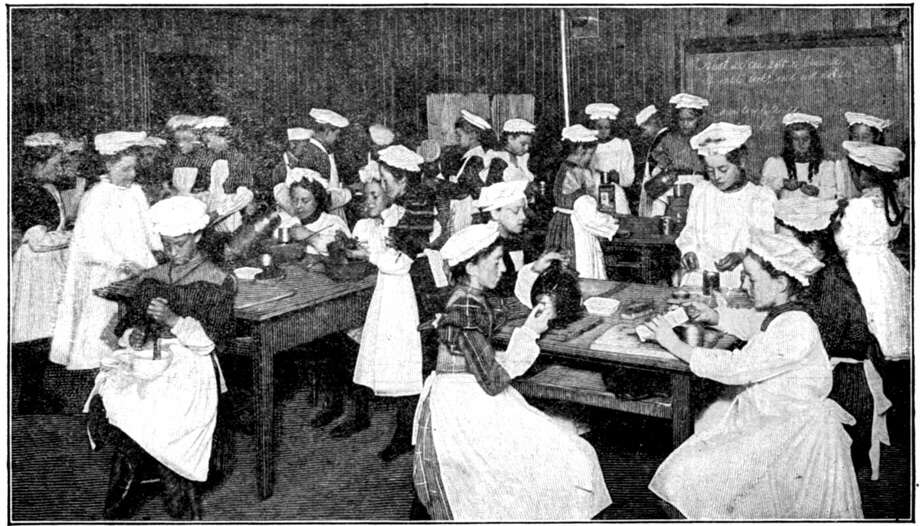
A SCHOOL KITCHEN WHERE BOTH BOYS AND GIRLS LEARN TO COOK
If you have to come so far to school that you cannot go back to dinner and so must bring a luncheon with you, be sure to take plenty of time to sit down and eat it slowly and chew every piece of food thoroughly. Many children who bring luncheons to school just grab a piece of food in each hand and “bolt” it down as fast as they can possibly bite it off and swallow it, and then rush out to play.
Play is good and very important, but you had better spare ten or fifteen minutes of it in order to chew your lunch thoroughly and swallow it slowly, and then to sit or move about quietly for a few minutes before starting to play hard. 78This will give your stomach a chance to get all the blood it wants to use in digesting the food; for, you remember, when you romp and play, your blood moves outward toward your skin and away from your stomach. Don’t think that, just because you “picnic” at lunch, it is not as important as any other meal.
I hope, however, that it will not be long before almost every school will have a school kitchen and a lunch room; first, so that every girl at least can learn to cook. It is well worth while being able to do; indeed, no girl ought to be considered properly educated until she has learned to cook, and no boy either, for that matter. Then, if the school has this kitchen, it can be used to furnish hot luncheons, or dinners, for those children who cannot conveniently go home in the noon recess. Hot lunches are much more digestible than cold ones, and they taste much better, and are much less likely to be eaten in a hurry.
But why should we learn to cook? Why shouldn’t we eat our food raw instead of taking all this trouble and pains to cook it?
I know of a boy—a big lazy fellow—who is always forgetting to do things. He used to go away in the morning without leaving wood enough for the kitchen fire. So his mother said 79to herself one day, “I’ll teach him to remember.” The next morning he went off again and left no wood. At noon he came back “hungry as a hunter.” She called him in to dinner; and in he came, sat down, picked up the carving knife—then he stopped! What do you suppose was the matter? The beef was raw! Then he lifted the cover of the potato dish, and there lay the potatoes raw! Then he tried another dish and found nice green peas, but hard as little bullets. They were raw, too! Not even the bread had been cooked; it was a soft, sticky mass of dough. His mother, who is a jolly old lady, fairly shook with laughter when she told me about it. She said she never again had to tell him to split wood.
Now that boy didn’t need to be told one reason for cooking. We don’t like our food raw; it doesn’t taste so good. At first, perhaps, that doesn’t sound like a very good reason; but it is more important than you think. For it is a fact that, just as soon as you smell food, your stomach begins to get ready the juice that is to digest it. If this very first juice, which is called the appetite juice, is not poured out, then the food may lie in the stomach some little time before it begins to be digested at all. So it is quite important that our food should smell and taste 80and look good, as well as have plenty of strength and nourishment in it.
Another reason for cooking is that it either softens or crisps our food so that we can chew it better and digest it more readily. You know what a difference there is between trying to eat a raw potato and a nice, mealy, well-baked one, or trying to eat popcorn before it is popped and after.
Another good thing, too, cooking does, which is very important. It kills any disease germs, or germs of decay, that may happen to have got upon the food from dust or flies, or from careless, dirty handling.
Of course, some of our food, such as apples and other ripe fruits, and celery and lettuce and other green vegetables, we can eat raw and digest quite well; but we should be careful to see that they have been thoroughly washed with water that we know to be pure. Grocers often have a careless way of putting fruit and vegetables out upon open stands in front of the shop, or in open boxes or baskets inside the store, and leaving them there all day. This is very dangerous, because dust from the street, which contains horse manure and all sorts of germs, may blow in upon them; flies, which have been eating garbage 81or feeding at the mouths of sewers, may come in and crawl over them. You ought to be very sure that anything that you are going to eat raw, or without thorough cooking, has been well washed. And you ought to ask your mother to speak to your grocer, if he is careless in this way, and have him keep his fruit and vegetables, as well as sugar and crackers and beans and dried fruit, either under glass or well screened from flies and dust.
More important than almost anything else in good cookery is to keep the food and the kitchen and the dishes and your hands perfectly clean all the way through, so that nothing that will upset your digestion can get into the food. After things are well cooked, it is very important that they should be nicely served on clean dishes, on a clean table cloth, with polished knives and shining spoons and forks. This means not only that everything about the table and the food will be perfectly clean and wholesome, but that you will enjoy eating it a great deal more. And when you enjoy your food, you remember, your stomach can secrete the juice that is needed to digest it, very much faster and better than when, as you say, you are just “poking it down.”
If you have a school kitchen and a lunch 82room, you can learn the best way of cooking and serving things; and then, perhaps, you can do these same things at home and be a real help. Most children are fond of trying to cook, and I am glad that they are. Everyone, boys and girls both, should know how to cook simple things. Perhaps some day you will be stranded, like Robinson Crusoe, on a desert island! Perhaps the rest of the family may be sick. How nice it would be for you to be able to prepare breakfast for them. I know a family where the youngest boy often rises early and gets breakfast for five. He can fry the bacon and boil the eggs and make the coffee and mush and biscuit just as nicely as his mother can; and he takes pride in it and enjoys it.
Cooking is what we call an art. Everyone, of course, can learn to do it; but some people can do it much better than others, just as some boys and girls can draw better than others. I hope some of you will be what we might call “artist cooks.” Take pride in the art and learn all that you can about it. There are so many things a cook should know.
A great deal of good food is spoiled by bad cookery, particularly by frying slowly in tepid grease, or fat, so that it becomes soaked with 83grease. You should have the frying pan just as hot as possible before you begin to fry; and then the meat or potatoes or cakes will be seared, or coated over, on the outside, so that the fat cannot soak into them, and they will not only taste better, but will be much more digestible.
In baking you will have to be careful not to let the oven become too hot, or else the meat or bread will be burned or scorched. Even if the heat does not do this, it may harden and toughen the outside of the meat so that it is almost impossible either to chew or digest.
Sugar is really a very good food if you do not eat too much at once, and so pure candy is good for you if you do not eat too much. The very best time to eat it is at the end of a meal. If you learn to make it at school or at home, you can always have some to eat after your luncheon without having to buy it. If you do buy candy, don’t get the bright colored kind; it looks pretty, but it may hurt you. And be sure to see that it has been kept under a cover, where the dust and flies could not get at it. Dust is dirty, and flies don’t wipe their feet. You want clean, pure candy.
Of course, after cooking, you will always be very careful to wash up all the pots and pans and dishes that you have used. Food and scraps 84that are left sticking to dishes and cooking utensils very quickly turn sour and decay; and then the next time the dishes are used, you will perhaps have an attack of indigestion, and wonder why.
There are two things you should always notice: Whether the bread you eat is sweet and thoroughly baked; if it is soggy and sour, it will make trouble in your stomach. Whether all your food is clean and fresh before it is cooked; this you can tell by your eyes and nose.
When, at home, you give the baby a ball or a key or a watch to play with, what does he do with it the very first thing? He is never quite happy, is he, until he has put it into his mouth? Does he want to eat it? No, he wants to feel it; and he has not yet learned to feel very carefully with his hands, as you do.
Can you feel with your mouth? If you have the least little hole in one of your teeth, you know it as soon as you rub your tongue against it. How big it feels and how rough the edges seem! If you take a looking-glass, you find, if you can see the hole at all, that it is just a tiny, tiny hole.
Your tongue and lips, like the rest of your skin, 85are always touching and feeling things for you and sending messages to the brain. They say whether your milk is hot or cold, and whether the food you eat is soft enough and quite right in other ways. Your tongue is a very busy little “waiter”: he passes the food about in your mouth for the teeth to chew, and he rolls it about at a great rate. But he does more than this; he tells you something about how it tastes—not everything, as you may think, but only whether it is bitter, sweet, sour, or salty. Queer as it may seem, your nose tells you the other “tastes,” which are really smells. It is your nose that says whether you have a strawberry or a piece of onion in your mouth, whether it is coffee or cocoa that you are drinking.
Of what other use is your nose?—for only a little patch in the upper part is for smelling and tasting. The greater part of the nose is to breathe through. You see, your nose warms and moistens the outside air that you take in, so that, by the time it reaches your throat, it is as warm as your body and does not hurt your throat. Your nose also strains, or filters, out of the air the dust, lint, and germs that may be floating in it.
You should always keep your lips closed and breathe through your nose. Whenever you cannot 86breathe through your nose, there is something the matter. It may be that your nose is swollen shut with a “cold”; but that will last only a few days. If, however, your nose often feels “stuffed up,” there is probably something in it or behind it, that ought to be taken away. A throat doctor can easily cure you; and, when he has, you’ll be surprised how much better you feel and how much faster you grow.
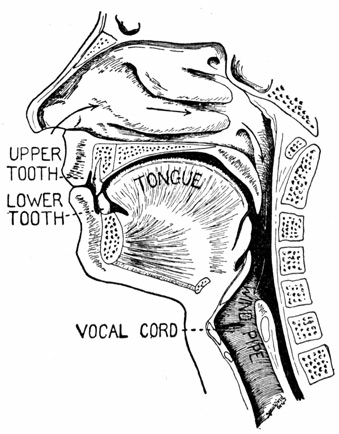
A CLEAR PASSAGE TO THE LUNGS
(Follow the arrows.)
I once knew a little girl whose nose was always blocked up. She had headache and felt tired most of the time and was behind in her classes. The doctor told her what was the matter, but her father and mother were afraid that it might hurt her to have the doctor take out what was clogging her nose. Well, what did she do? Instead 87of crying and being afraid, one day she walked right into the doctor’s office and asked him to take out the adenoids, as we call these growths that block up the nose. And after the doctor had taken them out, she began to grow well and fat and strong so fast that she soon “caught up” in her classes.
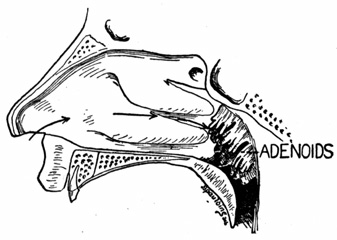
A PASSAGE BLOCKED BY ADENOIDS
When you breathe well through your nose, you can smell and taste better, too. In fact, when your nose is clogged, you cannot smell at all.
How does this sense of smell help us? You say we can smell the flowers and the fresh air after the rain, and cookies baking, and all the things that we like so well. Yes, and these give us pleasure; but how about the bad smells? The bad smells are warnings. If there is a dead mouse or rat about, we smell it; and that leads us to look for it and take it away. We smell the dirt and get rid of it, and thus keep away sickness. When we walk into a room, if the air is bad we 88smell it at once and open a window or a door, and so save ourselves from being poisoned.
Some people hurt their noses by smoking tobacco. The inside skin of the nose is very delicate, and the smoke going back and forth through the nose and the throat keeps them from doing their work properly. It is very bad for little children even to smell tobacco smoke. It seems in some way to keep them from growing as they would in clear fresh air. What a silly habit smoking is! It does no one any good. It hurts not only the people who make the smoke, but the people who have to smell it. Most of the people who smoke tobacco have to learn to like it. It almost always makes them very sick when they first begin.
Sir Walter Raleigh, or the men he sent to America, first taught our great-great-great-grandfathers to smoke. His men bought tobacco of the Indians here and took it back to England; and Sir Walter himself learned to smoke and made smoking fashionable. The first time that Sir Walter’s servant saw him smoking, he thought his master was on fire; so what did he do but bring a big bucket of water and throw it all over him! I wish that that bucket of water had settled the matter, so that Sir Walter had stopped 89smoking and had never taught anyone else to smoke. If it had, think how much money might have been put to better use, for smoking is a very costly habit. And it is not only wasteful of money, but, worse still, of health; for it is the cause of a great deal of poor health and disease.
Remember that you want the air you breathe perfectly fresh and clean and not spoiled and poisoned by tobacco smoke.
When I was little and playing with my brothers, I did not always do what they wanted. So they’d sometimes say, “We’ll put him in Coventry, then he’ll do it.” They did not really put me anywhere. They simply would not speak to me or answer anything I said. It was just as if I were entirely alone. Of course it was a quick way to make me ready to take my part in the game again.
How do you think you would feel if you never, never could speak to anyone, and no one could speak to you? What a quiet world we’d have! Almost every day I meet a boy who can’t hear and can’t speak. How does he ask for things? He makes letters and spells words with his fingers, and his friends watch his fingers and read what 90he says. Is that the way you do? “No, indeed,” you say, “I talk.” “What do you talk with?” “I talk with my mouth.” Yes, that’s true enough; but if you did not use something besides your mouth, you’d never make a sound.
Where does the sound come from? Feel gently with your finger and thumb along the front of your neck. Do you find something harder than the rest of your throat? That is the large tube called your windpipe. Do you feel a ridge sticking out from this? Now sing or talk a little. You can feel the ridge move up and down, and the sound thrill in it. That is where the sound comes from. That is your voice-and-music box, or larynx.
You have seen the little red rubber balloons, haven’t you? You blow into them until they are big and round; and then, when you take your mouth away, out comes the air, making a squawking or whistling sound. Now, if you look closely at the mouthpiece, you see a tiny piece of rubber tied across it. The air rushing past this rubber is what makes your balloon sing.
Your own music box is made on the same plan. When you breathe out, the air is pushed from your lungs up the pipe that we call the windpipe. In the upper part of this is the little box, a 91corner of which you can feel with your thumb and finger. Across the box, inside, are stretched two folds of skin and muscle, just as the rubber is stretched across the opening of the balloon. Whenever you like, you can blow out your breath between these folds of skin in your voice box. Blow it out in one way, and what happens? You are singing. Blow it out in another way, and you are talking; in still another way, and you are just making a noise—perhaps mewing like a kitten, or neighing like a horse. If you pull these folds of skin close together, you can close your windpipe and “hold your breath.” A cough is made by filling your chest with air, holding the folds close shut, and then suddenly “letting go.” How many sounds you can make from one tiny music box! Of course the muscles of the mouth and throat, and the teeth and the tongue all help the voice box as much as they can.
One of the best ways to keep your voice clear and strong is to dash cold water every morning on your throat and chest, then to rub with a coarse towel till your skin is pink and warm. Gargle your throat with cold water if your voice is husky. Singing is very good for you, too; but don’t try to sing too hard. Sing easily and gently, and see how many words you can sing without 92taking a breath. That is good for the lung-bellows as well as the voice box. Always sing in fresh air, but not in cold air.
When you talk, try to make all the words clear and distinct; open your mouth and let the sound out. Once I had a big grown boy in one of my classes who did not open his lips properly when he spoke. So I asked him to prop his mouth open with a piece of stick and then talk. I made him do it until he learned to speak much more clearly. A famous Greek orator, named Demosthenes, who had a habit of mumbling his words, trained himself to speak clearly by putting pebbles in his mouth and then reciting in a loud voice.
When you want your voices to sound pleasant,—and that is always, of course,—you must call on your brain to help. That is your thinking machine. Always think twice before you let anything unpleasant or unkind come out of your voice box. How happy we could make everyone about us if we followed this rule!
Suppose, as you are walking home from school to-day, you are about to cross the street when you see an automobile coming very fast. What do you do? You stop, of course; wait for it to go 93by, and then start on again. Why do you stop? “Why,” you say, “if I didn’t, the automobile might run over me.” Something of that sort would just flash through your mind, wouldn’t it, in the very same second that you first saw the automobile coming. Now, as you know, you think with your brain. But what was it this time that set your brain to thinking? “Nothing,” you say, “I just saw the automobile coming.” And that is true in a way: you didn’t need anything more than your eyes to tell you.
But how did your eyes get the message to your brain, and how did your brain tell your legs to stop walking? We must have in our bodies a kind of telephone system. And that is, in fact, just what we have. Our brain is our “central office”; and our nerves are the wires, running from all parts of our body to the brain, carrying messages back and forth.
An old man and an old woman lived out on the very edge of a little town. One day their house caught fire and was blazing away before they noticed it. They rushed to their neighbor’s telephone and rang up “Central” to tell her to “phone” for the firemen and hose cart. Kling a-ling-a-ling! went their bell, but no “Central” answered; and while a man was running to town 94to get the firemen, the fire got such a good start that the house burned down.
You can see from this why we need a central office in good working order, when we use the “phone.” All the wires run into the one building, and there must be some one there to receive calls and see that they are sent out to their proper places. In this case, you see, “Central” should have been at her post to see that the message went on to the engine house, and then the fire would have been put out “double-quick.”
The “central office” of our Body Telephone System is just as important and just as necessary to keep in good working order. It would be very little use to have even the keenest of eyes and the sharpest of ears, with the readiest of nerve wires to carry their messages into the center of the body, unless we had some organ, or headquarters, there for switching the messages over to the nerves running to the right muscles to tell them what to do. If the brain-“Central” should fail in its duty, or get out of order, then the body would be in serious trouble at once.
Every day we read in the papers of accidents because somebody didn’t think, as well as see or hear. People see cars and automobiles coming, but don’t give them a thought and so are 95run down and hurt. They hear the whistle of the engine at the crossing, but drive on just the same, without seeming to have heard it at all. They are absent-minded; the operator in the “central office” seems to be off duty, or busy about something else. But if we are going to get on in this world of cars and automobiles and all sorts of unexpected things, we must always “have our wits about us,” as the saying goes, ready to send the messages out to the muscles in our legs and arms and fingers just as soon as any one of our “Five Senses” “rings up” the “Central” in our brain.
Our body wires do not look at all like telephone wires; and the brain, if you could see it, would never suggest to you a central office.
The nerves are fine white cords, the smallest ones finer than a hair, and the largest so big and strong that you could lift the body by it; and their branches run all over the body, to the muscles and the blood tubes and the skin and all the other parts, as the picture shows. You have already read how the skin can tell you when you feel warm and when you feel cold and when something hurts you.
The brain is a soft wrinkled mass, partly gray and partly white. It is in the head; and because 96it is very soft and easily hurt, Mother Nature has put around it a strong wall, or shell, of bone—the skull, or brain box. Feel your head and see how very hard this bone is. Solomon, the Hebrew poet-king, called it the “golden bowl.” I suppose he called it a “bowl” because it is round like one, and “golden” because it is so precious. People do not often grow well again if the “golden bowl” is broken or even cracked.
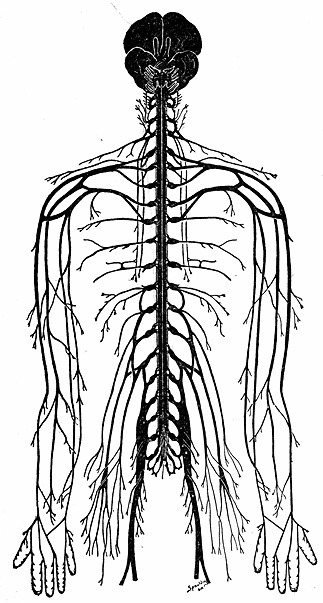
THE NERVOUS SYSTEM—OUR BODY TELEPHONE
The picture shows the brain, or “Central,” and the thick nerve cord that runs down through the backbone, and the principal nerves of the back and the arms.
The big nerve cable, called the spinal cord, that connects the brain with the rest of the body, and carries all the messages backward and forward, runs down the back and is protected by the backbone, or spine, which 97is hollow, so that the cord can run down through it. This backbone is jointed together so beautifully, too, that you can bend your back about and stoop over, and carry heavy weights on your back, and yet the bony tube still protects the cord inside. Solomon calls this the “silver cord,” because it is so white and shiny that it looks like silver. You see, our bodies are full of beautiful as well as wonderful things.
Probably sometime when your teacher has asked you to recite a poem you have all learned, someone in the class has answered, “I don’t remember it,” or has stood up and recited the first few lines and then stopped, and thought, and finally had to say, “I can’t go on.”
Now what is the matter with this boy, or girl? He looks bright enough, and you will probably remember that he was in the class when you learned the poem. “Oh,” you say, “the poem didn’t stay in his head.” No, it didn’t “stick” in his memory; but why didn’t it?
Some of the messages that the Five Senses carry to the brain are answered at once, as when we move away from danger, or reach out our hands and help ourselves to butter, or take off a shoe to shake out a pebble. But there are other messages that do not call for an immediate 98reply, and are just stored away for future use in the big “central office” of our Body Telephone, in what we call our memory. And later, when the proper message is sent in by our eyes or ears, or other sense organs, which reminds us of this message which they sent before, perhaps several weeks, months, or even years ago, it wakes up the old message stored away in the memory, and we say we “remember” what happened to us, or what we learned at that time.
So, when your teacher asks you to recite a certain poem, and your ears hear the title or the first line, you recall the rest of the verses and the lesson about it. How many things does the word “Christmas” wake up out of your memory? or the sight of soldiers marching? or the first taste of strawberries in May?
You think about a great many things that you never do. Really you are thinking almost all the time you are awake. And besides the messages that “Central” just stores away for future use, there are a great many messages being carried back and forth along the “telephone system” all the time, that you don’t keep track of at all—the messages that keep the stomach and the heart and the lungs and everything in your body working together properly.
99How are we to take care of the telephone lines and “Central” of our nervous system? Whatever you do to build up and help the other parts of the body will help your brain to feel and think and remember; and will help your muscles and nerves to answer promptly and truly whatever the message may be. Plenty of good food, plenty of sleep and fresh air, plenty of play, will keep your nerves and brain healthy and growing.
How many times have you been absent this term? No oftener than you were obliged to be, I am sure; for it’s almost as bad as being “put in Coventry” to come back and hear about the good time the rest of the class have been having, and feel that you “weren’t in it.” Of course, sometimes, when you are not well, you have to be absent; it is best that you should be. But it is better still to know how to keep well, so you won’t have to be absent, and won’t have to miss any good times in work or play all your life.
You remember that all the parts of your body are fed and ventilated by the blood, which is pumped to them from the heart. So long as this blood is pure and has plenty of oxygen in it, it does good to every part of the body to which it comes. But the moment that poisons and dirt and waste begin to pile up in the blood, then the blood that comes to the different parts of the body may be poisonous to them, instead of helpful.
Such poisons in the blood are particularly 101harmful to the nerves and the brain, because these are among the most delicate and sensitive of all the structures in the body.
Often we think of the body as a beautiful house. Now a house does not look very beautiful when it has dust and crumbs on the floor, buckets of greasy dishwater in the kitchen, and smoke from the furnace in the air! You could not live in such a place. No, the smoke must go out up the chimney, the dust and crumbs must be swept away, the dirty water must be drained off in pipes; the house must be not only cleaned, but kept clean all the time. This is true of your body, too.
Now Mother Nature sends the smoke from the body out through the lungs, and the crumbs and solid dirt down and out by means of the food tube. But the waste water—how does she get rid of that? The waste water, you remember, is in the blood vessels, mixed with the blood. How does she get it out of the blood? She sends it through three magic cleaners, or strainers,—the skin, the liver, the kidneys.
That the skin is a strainer, you already know; for you know how the skin lets out the waste water in perspiration, or sweat, and how important it is that we keep the little holes of the 102strainer open and clean. And you know, too, that most of the water that passes out of the body goes first to the kidneys.
The liver, however, is the largest cleaning machine of all and has to work very hard. The blood comes to it full of foods and poisons. This wonderful cleaner picks out the food it needs and takes up many of the poisons, too. “What does it do with the poisons?” you ask. Some of them it changes into good food, and others it makes harmless and sends away down the food tube in a fluid called bile. If we are strong and healthy, the liver has the power to kill many of the disease germs that get into the body. That is why sometimes, when you have had a chance to take mumps or grippe or some other “catching” disease, you don’t take it. Your liver kills the germs, or seeds. See how carefully Mother Nature has planned that we may be clean inside as well as outside.
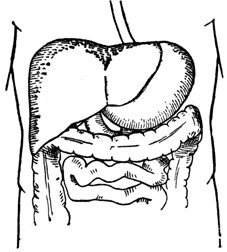
THE POSITION OF THE LIVER
Compare this with the diagram on page 26, and see how the liver partly overlaps the stomach.
But you must not over-work your liver. If you do, it may become too tired to do anything 103at all. Then all these poisons will spread through the body; the skin and the whites of the eyes will grow yellow, and you will be what is called “bilious.” When this happens, the poisons go to your brain, too, and make you feel sad; your tongue looks white instead of pink, and you have a disagreeable taste in your mouth. Your happiness depends very much on your liver.
“How shall I keep my liver rested and in good working order?” By eating only sound, wholesome, pure food, and avoiding dirty milk; by going to the toilet regularly every morning after breakfast; by keeping your windows open and avoiding the poisons and disease germs in foul air. Then, if you run and play and work out of doors, so that the muscles move a great deal and you breathe in plenty of oxygen to keep the body fires burning briskly, that will help a great deal.
Last summer up in the mountains I saw a big log close by the path. It had been sawed across so that the end was smooth. It was brown and weather-stained, so of course I knew that it had lain there a long time. How surprised I was to see a pile of fine fresh sawdust on the ground beside it. As I came nearer, I saw piece after piece of sawdust dropping, dropping, dropping, one after the other, from a hole in the log. I 104looked into the hole, and what do you think I saw? Hundreds of little brown ants, busy as could be carrying the sawdust, throwing it out, and then scurrying back to get some more. Several feet inside the log, other ants were cutting the sawdust, hollowing out the rooms of their house; and in another part others were getting food for the workers, and still others taking care of the baby ants. They were all helping one another, and whatever one ant did helped all the rest. That is the way with the parts, or organs, of the body. When one part works well, it helps all the rest; when one squad of tiny cells in the muscles or liver or heart is doing its duty, like the little ants, it helps all the other cell-workers in the body to keep healthy.
If you eat proper food, you help not only your stomach but your liver, too; for it has not so many poisons to get rid of. While you are helping your stomach and your liver, you are helping your heart and your brain, and so on. So what you do to help one helps all.
There are, however, some poisons that the liver cannot get rid of; but these the skin or the kidneys carry away. Have you ever seen kidney beans? The bean is the shape of a kidney. The 105kidneys are in the middle of your back, packed close to your backbone, on a line with your waist. This is a picture of them. Do you see the little tubes leading down from the kidneys, carrying the waste water and poison down into a kind of bag? The walls of this bag, called the bladder, will stretch, and it will hold about a pint of waste water. From the bladder a tube carries the water down out of the body.
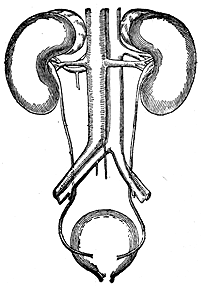
THE KIDNEYS AND THE BLADDER
The large tubes are the artery and the vein that carry blood to and from this part of the body.
You can help your kidney-strainers by emptying your bladder at certain times each day. Some children have to empty the bladder much oftener than others, but most children can form what we call regular habits about it, by trying to do it at the same times each day. If you are quite strong, five times a day is often enough: when you first get up, at recess, at noon, at four o’clock, and at bedtime. Many children do it much oftener than this; but as they grow older and the muscles grow stronger, they slowly outgrow this trouble, if they try to form the right habits.
There are many diseases of the kidneys; for, 106like the liver, they are sometimes over-worked and do not carry the poisons from the body. You are helping your kidneys when you drink plenty of fresh clean water every day, and also when you play or work hard enough to get into a good perspiration; for, as perspiring carries out some of the poisons, it leaves less for the kidneys to pour out. You ought to get into a good perspiration at least once every day, or better, three or four times, if you wish to keep healthy. The Bible says, “In the sweat of thy brow shalt thou eat bread”; and you must earn health and happiness at the same price.
You have seen that sitting or sleeping in rooms where the air is bad, or eating the wrong kind of food, or working after you are badly tired, will poison your blood and hinder the proper working of that beautiful machine, your body. These poisons are made inside your body, and you can prevent them by living healthfully and wholesomely. But there are other poisons, which may get into the blood from outside the body; and while it is best for you not to think too much about these, or to worry over dangers that may never come, yet it is well to know just enough 107about some of them to be able to keep out of their way, as far as possible.
The most dangerous form of poisons from outside the body are those made by the germs of some rather common diseases, which, because you can “catch” them from some one else who has them, are called “catching,” or infectious, or contagious.
Some of the germs of these “catching” diseases, like the germs of typhoid fever, of which we have spoken in connection with our drinking water, are carried in the water or milk that we drink, or upon the food that we eat; and one of the worst carriers of germs is the ordinary household fly.
Not so very many years ago, people did not know that dirt makes people sick. You see, they did not know anything about the disease seeds (germs) that grow so fast in dirt. They did not like to have flies about, because flies look so dirty and bite people and crawl over things and spot them. But nowadays, we will not have flies about because we know that they have been in dirty places where disease germs live, and that one little fly can carry thousands and thousands of these germs on his feet.
Have you ever looked at a fly through a magnifying 108glass or under a microscope? If you haven’t, try it sometime. You will see that his legs are covered with little hairs; and it is on these little hairs that the germs lodge. They are too small for you to see except with a very powerful glass; but scientists have proved that they are there, and they have found that there are always typhoid germs among them.
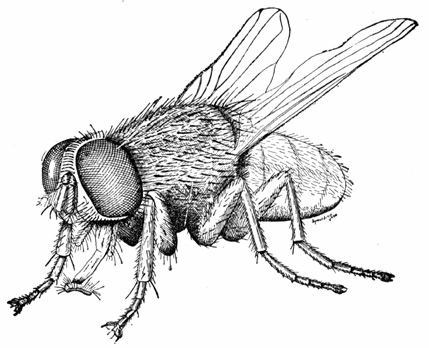
THE COMMON HOUSE FLY
As he appears through a magnifying glass.
Did you ever see a fly wipe his feet before he came into the house? No, indeed; and he goes anywhere he pleases, over the bread and into the cream. Yet he was born in dirt and bred in dirt, and he lives in dirty places all the time he is not crawling over your clean things and spoiling them.
109Flies are hatched from eggs; and these eggs can hatch only in piles of dirt, such as heaps of manure, or places where garbage and scraps from the house are dumped or thrown. We call the common fly the "domestic" or "house" fly, because he lives only in the neighborhood of houses and barnyards where heaps of manure and piles of dirt are allowed to gather.
When the fly first hatches from the egg, it is a little white, wriggling worm called a maggot, like those that some of you may have seen in decaying meat or fish or cheese. The maggots must have decaying substances to eat and live upon while they are growing, and this is why the eggs are laid in manure heaps and garbage piles.
It takes the maggot about five days to grow to its full size, and then it turns into a chrysalis. That is, it is shut up in a kind of case that it has spun for itself, like the cocoon of the silkworm or the caterpillar. In about five days more it breaks out of this cocoon and appears as a fly with wings.
So, you see, the eggs must stay in that manure heap about two weeks if they are to hatch. If, 110within that time, the manure is carted away and thrown out somewhere where it will dry, the little unhatched flies will be killed, or prevented from hatching. All we have to do, then, to be entirely rid of flies about our houses is to see that the heaps of manure and all piles of cans and garbage are taken away at least once a week.
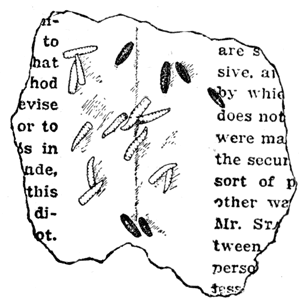
FLY MAGGOTS ON OLD NEWSPAPER
Note the size of the maggot compared with the newspaper type.
If manure heaps or piles of dirt cannot, for any reason, be carried away as often as this, then they can be sprinkled with something that is poisonous to flies, such as arsenic or kerosene. This will kill the maggots. If we keep every kind of waste and scraps from the house, and all the manure from the barn and the pig-pen and the hen-house carefully cleaned up, or sprinkled with some poison, we shall get rid of flies entirely and never need to use screens at the doors and windows. Until we do this, it is best to put screens at the doors and 111windows in the summer time, and particularly to screen carefully any place where food is kept or cooked; for we know that a great many cases of typhoid and of other diseases of the stomach and bowels, such as summer sickness, or summer diarrhea, and cholera morbus, are carried to our food by the dirty feet of flies.
Many of the germs of “catching” diseases—most of them, in fact—are carried in the air, in scales that have rubbed off the skin of the persons sick with them, or in spray that they have coughed into the air, or in saliva that they have spit upon the floor.
There is one sickness of this kind that I ought to tell you about, because it kills so many thousand people here in our own country every year. We sometimes call it the “Great White Plague.” Its common name is consumption, and the doctors call it tuberculosis. I dare say you have heard of it and wondered what it meant.
A few years ago people thought it could not be cured. They thought that children had it because their parents had had it before them. But now, the cheering thing about it is that we have found that Mother Nature herself can cure it with fresh air and sunshine and wholesome food. We have found, too, that people catch it 112from others who are sick with it, and need not have it just because their parents did.
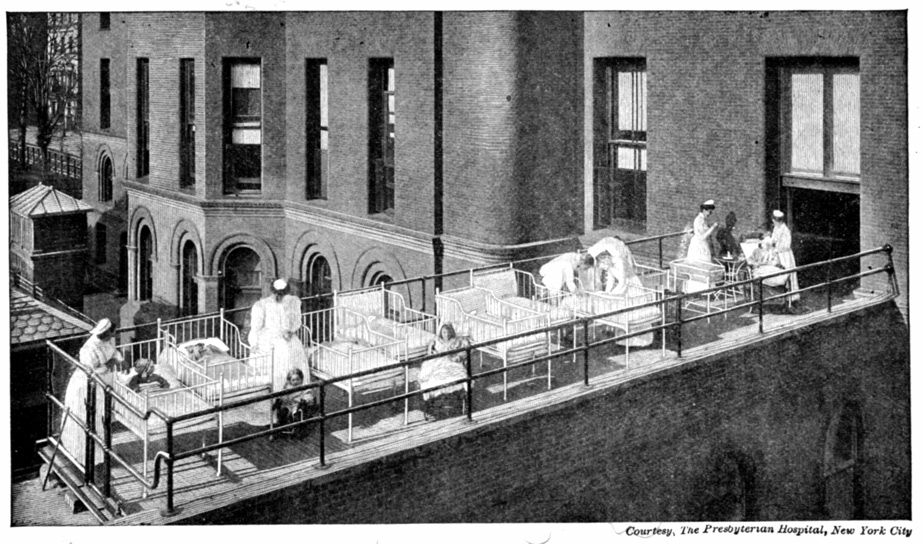
FRESH AIR AND SUNLIGHT ARE GOOD DOCTORS
This means, then, that thousands of people who have it need not die, but can be cured simply by living and sleeping out of doors and eating plenty of milk, eggs, and meat, nuts and fruit. There are camps for them in almost every state in the Union now. The fresh air gives them such a big appetite that they can eat more than most healthy people, and they soon get strong and well.
If all the people who now have consumption were taken out into the country and cured, there would be no one left for the rest of us to catch it from, and the disease would soon die. Some day our Boards of Health will decide to do this, and then consumption will become as rare as smallpox is now, and will kill only a few hundred people a year in the United States instead of 150,000 every year, as it does now.
People and governments are giving great sums of money, not only to cure the people who now have consumption, but to do something towards stopping the disease by keeping things so clean and people so strong that no one will ever have it. Even little children can help to fight and kill this “Great White Plague,” and I’ll tell you how.
114We know that, when people have consumption in their lungs, what they cough and spit out of their mouths and blow out of their noses (we call it sputum) has the germs, or seeds, of the disease in it. So, to keep other people from catching the disease, they must hold something before the face when they cough, and they must catch the sputum in paper (newspapers or paper napkins are very good for this) and burn it, for burning kills the germs. Then, too, they must not kiss other people on the mouth, and others must not kiss them. They must use their own drinking-cups, and never lend or borrow a cup. You see, you can look out for these things, yourselves. When grown people kiss you, just turn your cheek to them, instead of your mouth. Your cheek will not carry anything to your windpipe and lungs. And be sure to carry your own drinking-cup, or, better still, make the one for which you already have the pattern, every time you need one.
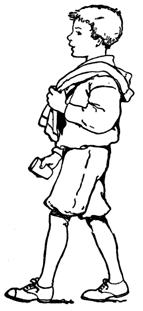
HIS OWN CUP AND TOWEL
This sounds easy enough; and it is, too. But sometimes people don’t know when they have this “plague,” and of course they do not feel 115that they must be careful. What is to be done, then?
If people won’t take care of themselves, then the government has to make health laws to protect them, and the health officers have to see that the laws are obeyed. In many of the states and cities, laws have been made so that nobody is allowed to spit on the sidewalk or in the cars or in any other public place; and common drinking-cups are forbidden at all park fountains and at the water-coolers in schools and trains and stations and other public places.
You ought to know about these things, because, as I have just said, other sicknesses, too, are carried about in the nose and mouth. Grippe, pneumonia or lung fever, and what we call colds are caught in exactly the same way. We used to think we caught them by being chilled; but we are much more likely to take them by being shut up in a hot, stuffy room with other people who already have them. Mother Nature never gave us such things in her beautiful, clean outdoors. We must wear clothes enough to keep us warm when we go out, and have bedclothes enough to keep us warm while we sleep; but we need not be afraid of catching any sickness from the clean outside air, either by day or by night. Drafts 116are not dangerous, except when our blood is already full of poisons and germs from foul air.
Of course it is foolish even for strong, healthy people to run any risks that can be avoided, and there is one other thing that you should keep on the watch against doing; and that is, touching or kissing or playing with other children who may be sick. It is better not even to sit in the same room with them if you can avoid it.
Many of the infectious diseases—and nearly three fourths of all the diseases that children have are infectious—are caught, as we have seen, from germs that are carried in the air. That is one reason why so many infectious diseases are likely to begin with running at the nose, or sneezing, or cold in the head, or sore throat. The germs, having been breathed in with the air, catch on the sides of the nostrils or at the back of the throat, and start inflammation and soreness wherever they land. This is just the way that measles, scarlet fever, chicken pox, whooping cough, and diphtheria begin. Nearly all colds in the head, and sore throats with coughing, are infectious; so the best thing to do whenever you have a bad cold in the head, or a sore throat, is to keep out in the open air as much as you can, until it is better. Of course, a cold is not such a serious 117thing in itself; but, if it is neglected, it may lead to some very dangerous troubles, particularly to inflammation of the lungs, and sometimes even of the kidneys or the liver or the heart. Several of these infectious diseases—measles, chicken pox, and scarlet fever, for instance—have a rash, or breaking-out, called an eruption, upon the skin. This is another thing easy to look out for; and if you see anyone with a rash upon his face and hands, it is a good thing to keep away from him and not let him touch you. Even if he should not have measles or scarlet fever or chicken pox, but only a disease of the skin itself, he still might spread the infection of that; for most diseases that cause a breaking-out upon the surface of the skin are infectious.
Some of these infectious diseases are so common among children that they are called Children’s Diseases, or the Diseases of Infancy, just as if it were natural for you to have them while you are children, and as if they were something that you have to have as a matter of course, before you grow up.
But it isn’t necessary at all to have them, if you will take care of yourselves and help your doctors and the Board of Health of your county or town or city to prevent their spreading. These 118diseases, although usually very mild, never do anyone any good whatever, and may do serious harm; for their poisons may stay in the blood and injure the heart or the kidneys or the nerves.
One thing I should like to urge you to do if you happen to get one of these “children’s diseases”; and that is, to stay in bed or out of school or away from work just as long as your doctor tells you to. This is important, because it is very dangerous indeed to become over-tired or overheated or chilled, or to get your feet wet or romp too hard or sit up too late, before you have fully recovered; and you will not have fully recovered until at least three or four weeks after you are able to be out of bed. But if you take good care of yourselves for three or four weeks after measles or chicken pox or whooping cough or a very bad cold, you will avoid almost all danger of their poisons injuring your heart or kidneys or nerves, and causing chronic diseases, like Bright’s disease or heart disease, later in life.
Perhaps now I have told you enough about poisons and sickness. You must not be frightened about them. I have told you these things so that you may understand why you must bathe, and brush your teeth, and wash your face and hands, and wear clean clothes, and breathe fresh air, 119and keep your windows open, and play out of doors—in fact, keep your bodies clean inside and out. I know you will be glad enough to do these things, troublesome though some of them may be, if you know the reason why. The best of it is that when you keep perfectly clean and healthy, not even the “Great White Plague” and cold seeds, or germs, can hurt you, even though they get into your mouth or nose; for Mother Nature gives healthy bodies the power to kill germs, and quite without our knowing it.
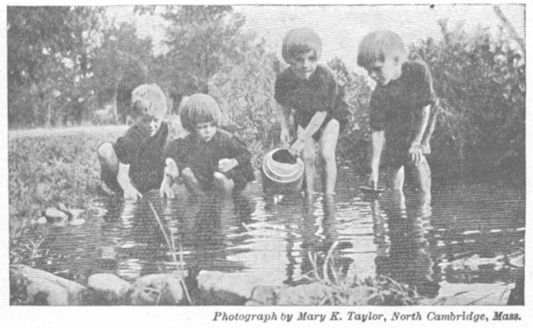
ENJOYING “ALL OUTDOORS”
Very discouraging to disease germs!
If you knew that some of your little friends were sick with an infectious disease like measles 120or scarlet fever, of course you would keep away from them, so as to avoid catching the disease. And if they knew that they had a disease that was infectious, of course they would want to let all their friends know of it, so as to prevent them from coming and catching it. But how can they let all their friends know? Sick people don’t feel like writing letters; and, even if they did, some diseases can be carried in letters. So that might not be at all a friendly thing to do.
This has always been the greatest difficulty in preventing the spread of infectious diseases—how to let other people know. So about fifty or sixty years ago, people got together and decided that the best thing to do was to appoint an officer known as a Health Officer, or a committee known as a Board of Health, in each town and in each county, whose business it should be to find out cases of infectious disease, and to warn other people against them.
These officers first ask all the doctors in the town to report to this Central Health Office, or Board of Health, every case of a patient with an infectious disease. Then, when the case has been reported, that office sends some one with a card on which the name of the disease is printed in large letters, and he tacks the card upon the front 121of the house or upon the fence around the lot, so that everyone who goes near the house may know that there is danger, and keep away from it. Then, sometimes, a messenger from the Board of Health goes into the house and talks to the family, and tells them how they can keep the patient in a room by himself, so as to prevent the rest of the family from catching the disease; and how they can best take care of the patient, and keep from carrying the infection through clothing or food or anything else.
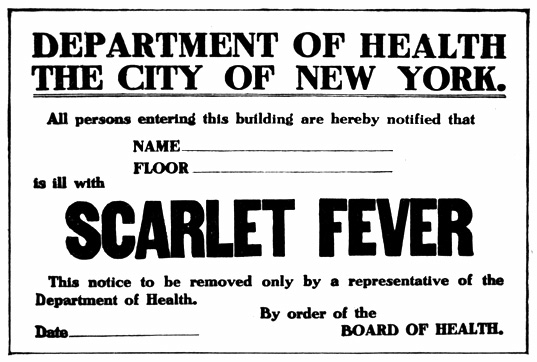
ONE WAY IN WHICH THE BOARD OF HEALTH PROTECTS US
Then, because anyone who has been sick with an infectious disease will still be shedding the germs of the disease and spitting or coughing, 122not only as long as he is sick, but for two or three weeks after he is beginning to feel better, the messenger will tell the family that the patient must stay either in his own room or within his own house or yard, for so many days or weeks. This is called keeping quarantine. The word comes from the Italian word quaranta, “forty”; because in the early days when the practice was first begun, the patients used to be kept by themselves in this way for forty days. While sometimes this is very inconvenient and hard and troublesome, it is really the only safe way of stopping the spread of these diseases; and I am sure anyone of you would be willing to take this extra trouble sooner than let any of your friends catch a disease from you, and perhaps die of it. Quarantine is also the best and safest thing for the patient, because it keeps him quiet and at rest until he has completely recovered, and until all danger that the poison of the disease will attack his lungs or heart or kidneys is over.
In some of the best schools now there is an examination of all the children every morning, by a visiting doctor sent by the Board of Health. If the doctor finds any child that has red and watery eyes, or is running at the nose, or sneezing, or coughing, or has a sore throat, he usually sends 123him home at once, so that the other children will not catch the infection. The school doctor is not thinking only about what seems to be a cold, although, as you know, it is very important that anyone with a cold should take good care of himself and should not let others catch it from him. The doctor sends the child home because this is just the way in which several other infectious diseases may begin—measles, scarlet fever, chicken pox, whooping cough, and diphtheria. For most infectious diseases, as you will remember, are caught from germs floating in the air and breathed into the nose and throat.
The Board of Health takes care of the public in many ways besides these. It keeps a very careful watch upon the water supply of the town, or city, so as to keep the houses and factories from running their drainage, or sewage, into it; for this, as you already know, might cause the spread of typhoid fever and of other diseases of the bowels and stomach.
The Board of Health sends men to examine, or inspect, the milk the dairymen bring, to see that it is sweet and pure, and that there are no infectious germs in it. And it sends men out into the country to examine the dairy farms and see that the cows are properly fed, and that the barns 124in which they are milked are kept clean; and that the water in which the milk pans and bottles are washed comes from clean, pure wells or springs.
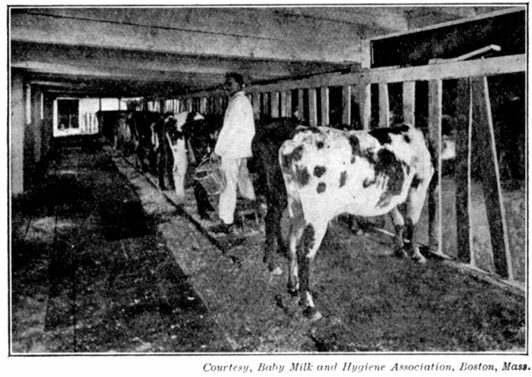
WHAT MILK INSPECTION MEANS
Clean barns, cows, pails, and milkers mean clean milk. The cows here stand in fresh, clean sawdust.
Another thing that the Board of Health does is to send an inspector round to look very carefully at all the meat that is sold in the butcher shops, and at all the fruits and vegetables at the grocers’. If he finds any meat that is diseased or tainted or bad, or any fruit or vegetables that are beginning to spoil, or any flour, sugar, or canned goods that have been mixed with cheaper stuffs that are not good to eat,—in fact, are what the 125law calls adulterated,—he may seize the bad and dangerous foods and destroy them, and summon to court the dealers who are trying to sell them. Then the dealers are fined or perhaps sent to prison.
So, you see, the Board of Health is one of the very best friends that you have, trying to keep your food pure and good, the water that you drink clean and wholesome, and the milk sweet and free from dirt or disease germs. You ought to help these officers and their inspectors in every way that you can. I know that it is sometimes troublesome to obey all their rules; and perhaps when you don’t know what the dangers are which they are trying to guard you against, it seems to you that they are too particular about a great many things. But just see what they have done already to make our cities and houses healthier and pleasanter places to live in.
Only one hundred and fifty years ago, for instance, that terrible disease called smallpox killed hundreds of thousands of people every year in Europe; and it attacked the eyes and blinded so many of those who recovered from it, that nearly half the poor blind people in the blind asylums had had their sight destroyed by it. In smallpox there is a terrible eruption, or 126breaking out, upon the skin, which is likely to leave it pitted and scarred; and even fifty years ago it was exceedingly common to see people who had been pitted by smallpox, or, as the expression was, “pock-marked.”
Cows have a disease somewhat like this, but much less dangerous, called cow-pox. Years ago, before dairies were inspected as they are now, dairy maids often caught this disease from the cows they milked, so that their hands would break out with pock-marks.
About a hundred years ago, a Dr. Richard Jenner discovered that the dairy maids in the country district in which he lived, who had caught this mild infection from the cows they milked, never caught smallpox even when they were exposed to it. So after studying over the subject for some years, he took a little of the matter, or pus, from the eruption on the udder of a cow that had cow-pox, scratched the arm of a little patient of his, and rubbed some of the pus into it. Only a short time after, the family of this little boy was exposed to smallpox, and all the other children took it badly, but he escaped.
This was the beginning of what we call vaccination; and as soon as it was found that this scratching of the arm and putting a little of this 127vaccine matter into it would cause only a few days of feverishness, and then after that give complete protection against smallpox, the Boards of Health all over the civilized world took it up and insisted upon everybody’s being vaccinated when a baby.
As a result, smallpox has become one of the rarest, instead of the commonest, of our infectious diseases. Only a few dozen people die of it each year in Europe, instead of several hundred thousands; scarcely one one-hundredth of the people now in our blind asylums have been sent there by smallpox, and I dare say that many of you have never even seen a pock-marked person.
Another disease that used to be very dangerous to little children is diphtheria. It was not only very infectious, but very deadly; and nearly half of the children who took it died of it, and the doctors didn’t know anything that would cure it. About twenty years ago, two great scientists, one a Frenchman named Roux—a student of the great Professor Louis Pasteur, of whom I am sure you have heard—and the other, a German, named Behring, discovered an antitoxin for diphtheria; that is, something to defeat the poison of the diphtheria germ. When this antitoxin is injected into the blood, it will cure diphtheria.
The doctors and the Boards of Health took 128this up too, and insisted upon its being used in all cases; with the result that where the antitoxin is used early, scarcely one in twenty of the patients dies, instead of eight or ten out of twenty, as before.
You know how careful we are all trying to be not to let consumption spread. By insisting that all houses shall be built so as to give plenty of light and fresh air to everyone; and by forbidding spitting upon the streets; and by insisting that food to be sold, especially milk, shall be clean,—by preventing the spread of the disease in every way, our Boards of Health have cut down the number of deaths from this disease nearly one half; and people in the United States, for instance, or in England, where these health laws are enforced, live now almost exactly twice as long on the average as they did one hundred years ago, or as they do now in India and in Turkey, for instance, where the people are ignorant and dirty and careless.
So you see that even if some of the health regulations do seem rather troublesome and fussy, it is well worth while to try to follow them and help the health inspectors in every way. Even little children can help very much in keeping the houses and the cities in which they live clean and healthful and beautiful.
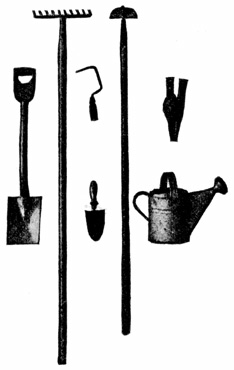
BETTER TO TAKE THAN MEDICINE
When school is over, out you go with a rush, into the open air. You have worked hard all day, and now you have two hours before supper to do just as you like.
Perhaps you will play tag, or prisoner’s base, or stealing sticks, or town ball. They are all fine fun, and they exercise every muscle in your body and make your lungs breathe deeper and your heart beat faster, and make every part of you grow stronger.
Perhaps you have a few chores to do or errands to run; but even these are almost as much fun as play and give you good exercise in the open air and, what is better still, a feeling that you are being of some use in the world, which is one of the happiest and 130most satisfactory feelings that you will ever have, if you live to be a hundred years old.
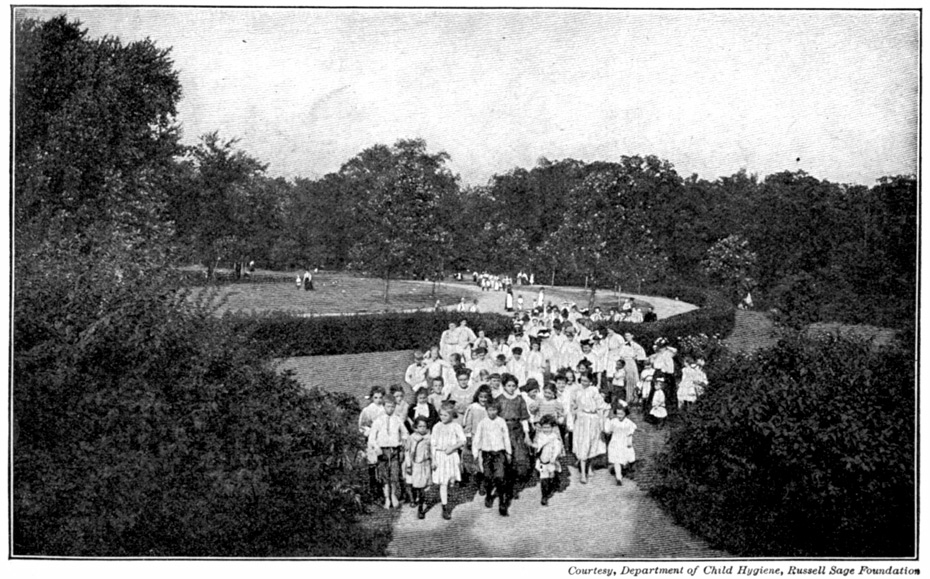
OUT FOR AN AFTERNOON IN THE PARK
But when you have finished your work, you must not forget to play real, lively, jolly games out of doors—ball and tag and hide-and-seek, and all those games that children love.
Hide-and-seek is a good game, because, when you are caught, you can stand still a few minutes and rest. When you are hiding, you can take a good breath for the home-run you have to make. Most games, in fact, are planned like this—a run and a rest, and then another run. While you rest, some one else is taking his turn at the bat, or at being “It,” or whatever is the hardest part of the work. This is one reason why games are so good for you to play.
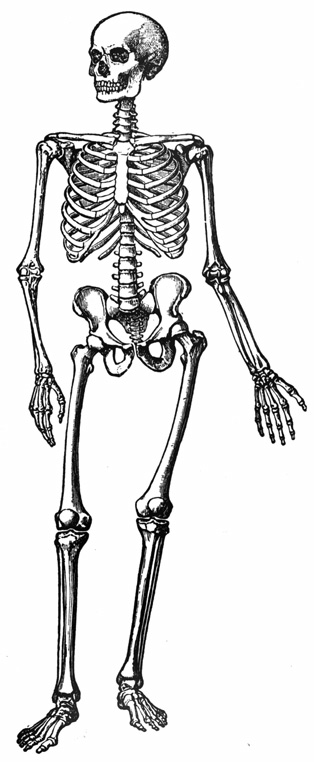
SKELETON OF A MAN
You see, when you run, you are working your muscles and heart-pump very hard; and if you kept running all the time, you would burn up so much food in the muscles that the heart couldn’t pump blood fast enough to wash away all the waste, and would just chug-chug-chug till it tired itself out. When you are tired, it is time to stop and rest; for being tired means that the poisons are not being carried away from the muscles fast enough, and that your heart is working too hard.
132What is it in your body that gives it stiffening to stand upright, and makes levers in your legs and arms to move it about? When you feel your body and arms and head with your fingers, what are they like? Isn’t there something hard and then a soft kind of pad over it? We call the hard things bones. Your teacher will show you some. These are white and chalky looking; but when they were alive, they were a beautiful pinkish white color.
So you have a pretty pearl-colored framework, the shape of your body. This, which is called your skeleton, makes you stiff enough to stand up and walk about. 133Now bend your arm and turn your wrist and open and close your hand. You find that your frame-work is jointed. When you are tired standing, you can bend your joints and sit down. If you want an apple, you can close your fingers and pick it up.
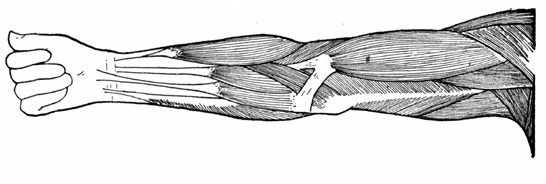
THE MUSCLES OF THE ARM
What are the soft pads that you felt over the bones of your arms and legs? Stretch your right arm straight out in front of you and take hold of the upper part of it with your left hand. Now clench your right fist and bring it toward your shoulder. Can you feel the elastic pads, or bands, moving? What are they doing? They are pulling your hand up to your shoulder. 134When you walk, you can feel the elastic bands moving your legs along. So every move we make, these elastic ropes are at work pulling us about and letting us sit down and making us run and jump. We call them muscles.
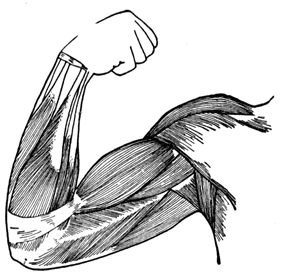
WHEN THE MUSCLES SHORTEN
You have perhaps seen jointed dolls. The strings and rubber bands on their joints help to make them move; but the dolls don’t act as if they were alive. They have no telephone system to tell their bodies how to move.
If you will stop and think how many “moves” you make in a day, you’ll know how hard your muscles have to work. They’d be quite tired out if they did not have plenty to feed on all the time and did not rest at least nine hours a day. I told you how the food is melted and carried about in the blood. It is the blood that brings the muscles their food and keeps them alive and makes them strong enough to move the joints and the bones.
What does all this playing do for you? It makes you grow not only big, but strong, too. What puny little things you’d be if you couldn’t get out and run and play and make your muscles strong and your nerves do just what you tell them to do.
I know of ten or twelve little chickens that 135hatched a few weeks ago. There are so many cats about, that the poor little chicks have to be shut up in the barn all day. At first they ran and played and jumped on their mother’s back, but now they hump their shoulders and hang their heads and don’t seem hungry and look sad and sick. They are not so big as some that hatched later. Can you tell me why? Of course you can. You know that it is outdoor exercise and play that chickens need, and that you need to make you grow big and strong, too. Of course, you will have to keep your backbone straight and your chest out and your head up; but all these things will be easy for you if you are perfectly well and strong.
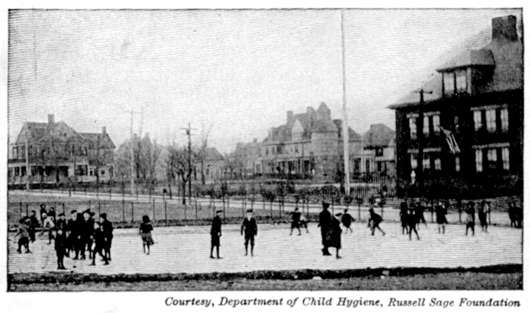
A SKATING POND MADE OUT OF A GARDEN
The school garden is flooded in winter—a fine place to skate right after school.
The school tries to take just as good care of your health and growth as it can. Your lessons are short, and you change from one to another frequently, with perhaps drills or calisthenic exercises between, so that you need not sit still too long at a time; and the seats and desks are of different sizes so that you need not sit at a desk that does not fit you. When your teacher urges you to go out of doors and play at recess time, even if you do not want to, you must think to yourself, “It will rest me and make me grow big and straight and strong.”
136When you come home from school, go out of doors and stay out just as long as you can. Don’t let dolls or toys or picture books tempt you to stay in the house. The pictures out of doors are ever so much prettier, as soon as you learn to see them. But some of you live in crowded cities. I hope you are near a park or a playground, where you can have a good romp with other children, and use the swings and see-saws and bars, and the skating pond in winter, and the swimming pool in summer.
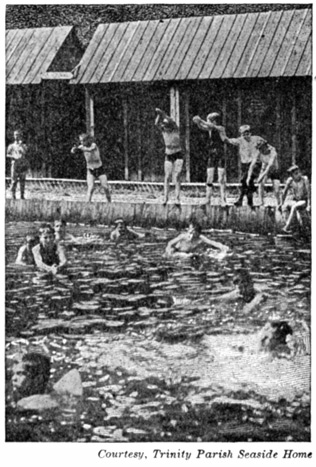
SPLENDID EXERCISE FOR LUNGS AND MUSCLES
What fun swimming is! You can learn easily if you have a safe place and an older person to teach you the stroke. You can roll over on your back in the water, and float, and dive; but you 137must not stay in longer than twenty minutes, and not so long as that sometimes. As soon as you begin to feel chilly, come out. Swimming not only cleans your skin, but is splendid exercise for your lungs and muscles.
All this play out of doors will help your appetite, and that will make you ready to eat the right kind of food, and this food will get into your blood and keep your muscles firm and strong.
I am going to tell you what to do in the case of some of the little accidents that may happen to anyone, and especially of the kind that children meet with in playing; but I don’t want you to stop playing for fear you’ll be hurt. Mother 138Nature can usually heal all the bumps and cuts and scratches that come from wholesome play.
You can, however, help her very much by keeping the scratch or cut perfectly clean. This is the chief thing to remember. Wash it thoroughly in clean water. Hold it under the pump, or faucet, and let the water pour down on it.
If you can, pour some antiseptic, or germ killer, over the cut, and wrap it up in a clean cloth. There is a medicine called peroxid of hydrogen, which is good for cuts and wounds, but an older person will have to put it on for you.
If the scratch is from a finger nail or the claw of a cat, or if the wound is the bite of some animal, you must be sure to have your mother or a doctor clean the wound with strong medicine. You see, nails and claws and teeth are, as a rule, dirty, and have on them germs that will get into the cut and make it swell and be very sore indeed.
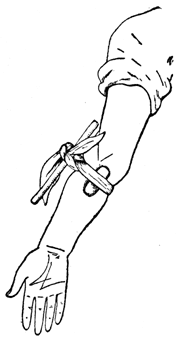
THE TIGHT BANDAGE HIGHER THAN THE CUT
Sometime you may have a cut that is deep. You will see the bright red blood spurt from it. This means that you have cut one 139of the blood pipes called arteries. If the cut is on the arm or the leg, you should take a cloth or bandage and tie it tightly around the arm or leg above the cut; and if that does not check the blood, put a piece of stick under the cloth and twist the stick, as in the picture. For a cut like this you must get help as soon as possible, and keep quiet, or else you will increase the flow of blood.
If you get anything in your eye, be sure not to rub the eye; don’t even wink hard if you can help it. You will only make the pain worse, because you will scratch the eyeball. Let some one take out the bit of dust or the cinder or the fly, or whatever it is, as quickly as possible. Often, if you close the lids gently and hold them so, the tears will wash the speck down for you.
If you should bruise yourself, the best way to treat the bruise is to pour either quite cold or quite warm water over it, and keep this up for several minutes; or to put it into a bowl of hot water. Then tie it up in a bandage of soft cotton cloth or gauze and pour over it a lotion containing a little alcohol—about one sixth or one fourth. This, by evaporating, cools off the bruise and relieves the pain.
If your ear, or nose, or a finger should happen to be frozen or frost bitten, the best thing to do 140is to rub it hard with snow until it thaws out and becomes pink again. Above all, don’t go too near the fire, and don’t go into a very warm room too soon.
If you get one of those uncomfortable itchy swellings on your feet called chilblains, which come from cold floors in your houses, or from wet feet, or from wearing too thin shoes and stockings, don’t put your feet too near the fire, but rub them well with turpentine just before going to bed at night. This will often take all the pain and itching out of them.
Sometimes people make the mistake of drinking something that is poisonous. Of course, one good way to prevent this is to have every bottle in the house carefully marked and never to take anything from a bottle without reading the mark, or label. Another good way is not to have poisons about any more than we actually need to.
Still, even so, sometimes a mistake is made. If you ever make such a mistake, the best thing to do is to drink as much warm water as you can, and into the second cupful to put a tablespoonful of dry mustard or two heaping tablespoonfuls of salt. This will make you vomit, and up will come the poison. The water makes the poison weaker. If this doesn’t make you throw up the poison, 141have some one tickle the back of your throat with a feather. There are a great many kinds of poison and as many things to take to cure them; but this is the only remedy I shall tell you about, because, by the time you have tried this, some older person will probably have come to help you.
All the medicines that you see advertised as “Headache Cures” are dangerous poisons if taken in too large doses; and most of them in small doses weaken the heart. They are what we call narcotics; they just deaden the nerves to pain without doing anything whatever to relieve or remove the cause.
If you have a headache, the best thing to do is to go and lie down quietly and rest or sleep, until it goes away. A headache always means that something is wrong; it is one of Nature’s most valuable danger signals. When your head aches, Nature is telling you that you have been over-straining your eyes, or breathing foul air, or eating some food that does not agree with you, or forgetting to go to the toilet regularly, or not getting sleep enough. The sensible thing to do is not to swallow some medicine to deaden your nerves to the pain, but to find out what you have been doing that is unhealthful for you, and then stop it.
Most of the medicines called “patent medicines,” 142which are advertised to “cure” all sorts of pains and troubles, contain poisons, and are particularly dangerous because they easily lead one to form the habit of taking them. Nine tenths of them are either absolute frauds,—of no strength or use whatever,—or else they contain alcohol, or opium, or some of the dangerous drugs made out of coal tar.
Now about burns. You need not wash them, because the heat has killed the troublesome germs. They need to be covered from the air, if the blister is broken. Cover them thickly with olive oil or vaseline, or common baking soda mixed with a few drops of water. This makes a good paste to put over them, and it will ease the pain. (This is the way to treat a wasp or bee sting, too, after you have pulled out the “stinger.”) If the blister of the burn is not broken, just keep putting vaseline or sweet oil on it every half hour or so, and the blister won’t break; for the oil will make it limber and prevent it from bursting.
If ever your clothes should catch fire, do not run; the wind you make will only fan the flames, so that they burn faster. Lie down and roll over and over, as fast as you can. If there is a rug or a quilt handy, wrap yourself up tight in it. My 143youngest brother once saved a little child’s life this way. He was not very old, but he remembered to put the child on the floor and roll him up in a rug.
However, the best way to prevent accidents with fire is to let fire and lamps and matches and kerosene and sparklers and firecrackers alone.
I am so glad that people are becoming sensible about keeping our nation’s birthday, the Fourth of July, and are doing away with the firecrackers that have killed so many thousands of children. The burns you get from firecrackers are much more dangerous than other burns. A dirt-germ often gets into them that may cause lockjaw. The name tells what it is: it locks the jaws together so that its victim cannot eat; and, of course, if he cannot eat, he cannot live very long. Next Fourth of July try getting flags and bunting and drums and horns, if you like, instead of these dangerous fireworks.
In keeping the Fourth one year not long ago, one hundred and seventy-one children lost one or more fingers; forty-one lost a leg, an arm, or a hand; thirty-six lost one eye, and sixteen lost both eyes; and two hundred and fifteen children were killed! This accounts for only the children; counting everybody, five thousand three hundred 144and seven people were killed or hurt. No wonder we begin to think that we ought to keep the Fourth in some other way.
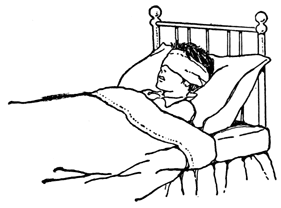
A RESULT OF CELEBRATING THE FOURTH IN THE OLD WAY
In the City of Washington, on one Fourth of July, one hundred and four people were taken to the hospital; but the following year when no fireworks were allowed to be sold, the hospitals did not have a single patient from the accidents of the day.
Water, as well as fire, has its dangers. If you ever fall into the water, be sure to keep your mouth shut and your hands below your chin. Then paddle with your hands gently, and you’ll swim, just as any other young animal does when first thrown into the water. Even your cat, who hates water, can swim easily when she falls in. If you keep your wits as she does, you will get along as well. Some people learn to swim just by trying by themselves.
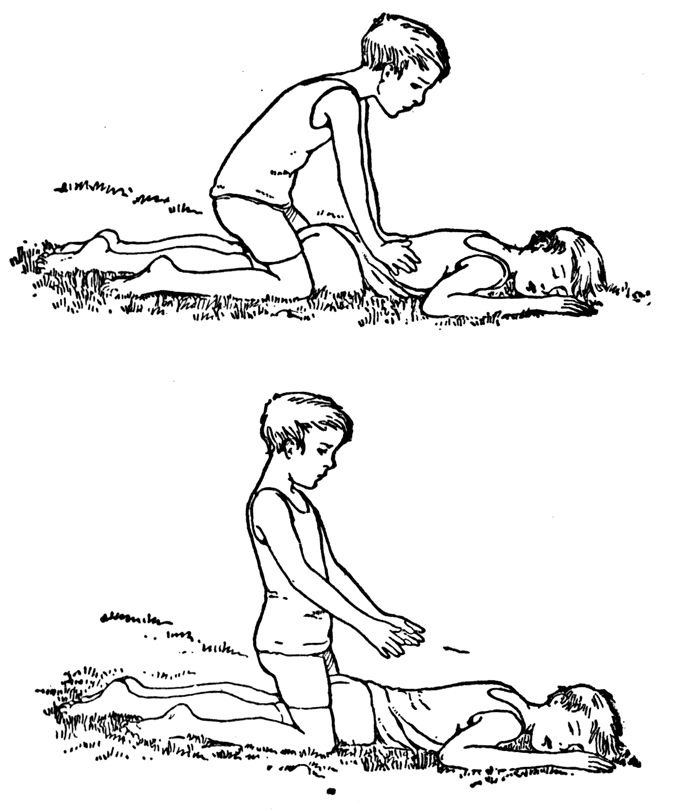
WORKING TO START HIS BREATHING AGAIN
If anyone in your party, when you are out boating or swimming, should be nearly drowned, the best way to revive him is to lay him, as quickly as possible, flat on his face on level 145ground, just turning his head a little to one side so that his nose and mouth will not be blocked. Then, kneeling astride of his legs, put both your hands on the small of his back and press downward with all your weight while you count three. This squeezes the abdomen and the lower part of the chest so as to drive the air out of the lungs. Then swing backward so as to take the weight off your hands, while you count three again; and then swing forward again and press down, again forcing the air out of the lungs. Keep up this swing-pumping about ten or fifteen times a minute for at least ten or fifteen minutes, unless the person begins to breathe of himself before this. Don’t waste any time trying to hold him up by the feet, or roll him over a barrel so as to get the water out of his lungs. Just turn him over on his 146face as quickly as possible and get to work making a weight-pump of yourself on his back.
If there is any life left in the body at all when it is taken out of the water, you will succeed in saving it. It is very seldom, however, that anyone who has been under water more than five minutes can be revived.
And now the thing that I want you to be sure to remember, I have saved for the last. No matter what kind of accident happens, keep your wits about you and keep cool. Be calm and think what it is best to do, instead of letting yourself be frightened. Of course, get some one to help you as soon as you can and, if need be, call for help as loud as your lungs will let you. But use that wonderful “phone” system to send in and out the messages that will help you to help yourself by telling your muscles what to do.
One morning I stopped a moment on the street to speak to a friend. Her little nephew had just finished eating some candy, and down went his candy-bag on the pavement. His aunt happened to see it. “Oh, no, Claude,” she said, “don’t you see the big green can there? Better put it into that.” But Claude was only three years old; and 147the can was so tall that he could not tell what it was, till we led him up to it.
Do you have cans like these in your town, too? It is good to think that every one of us, even such little fellows as Claude, can help to keep the city beautiful. But it is not simply to make things look nice that we have so many cans—cans for ashes, cans for papers, cans for food scraps. No indeed, it is to keep the city clean and make it fit for people to live in; for if dirty papers and scraps were left to blow about the streets, they would fill the air with germs and filth.
Any dust that blows about the streets is likely to be carrying disease germs with it. That is why we have sprinklers driven through the streets to wet them and to keep down the dust; and why, in large cities, the streets are thoroughly flooded at night. If the streets are kept damp and clean, then the air above them is cool and fresh and pure.
How does the city get rid of all the dirt and waste? From every house there are two kinds of waste. Some is taken away in pipes from the sink and bathroom out into pipes that run under the street, and these carry it away from the city to some stream or deep water that takes it entirely away from the town.
The waste stuffs that are not watery, but 148solid—cabbage leaves, apple cores, potato parings, and other scraps from the kitchen are carted away and burned or fed to pigs. The ashes and tin cans are carted away, also, and used in making new land or filling up hollow places.
Besides taking away the dirt, cities are careful to get clear, pure drinking water. They are very, very careful about this; and they usually have the water tested often, because, as you have learned, even water that looks perfectly pure may give people typhoid fever. That is why, when you are out in the country, on a picnic perhaps, you must not drink from the streams. They may receive the drainage from a farmer’s barnyard, or the sewage from some house.
The more we all learn about these things, the more careful will the city be to protect her people. To be sure, most cities now have Boards of Health who employ men and women to go about and see that the food in the stores is clean—no flies, no dust, and no tobacco smoke on it. They have laws, too, about keeping milk clean; and in New York alone these laws have saved the lives of thousands of babies. And they have laws about the care of streets and buildings and cars and parks and a great many other things.
In all these things we have been talking about, 149I want you to be thinking how you can help. For a city is made up of people—boys and girls and men and women. The city is what its people make it; and everyone must help, even the smallest children, no older than little Claude.
The first and most important thing for you to do is to keep yourself clean and tidy. And the next thing is for you to keep your back yard as well as your front yard and the school yard and the street free from papers and sticks and cans and old playthings. You can put away your things when you are through playing; or, if you are making a railroad or a town or a playhouse, you can leave it looking nice and tidy. You can help chiefly by putting away your own things. You know the old saying, “A workman is known by his chips”; and a good workman always works in an orderly way.
When you eat apples or bananas or oranges, don’t throw the skins or peelings about, but put them in a garbage can or swill bucket or cover them with soft dirt in the garden or stable yard; and don’t throw peanut shells, or scraps of paper and the like, about the streets or parks. You should begin to notice all these things and talk about them, and that will make other people begin to think about them, too.
150Then you can make gardens instead of leaving bare, untidy back yards. I think that nicely kept vegetable gardens are almost as pretty as flower gardens. If you cannot mow the lawn, you can at least cut the long grass on the edges; and that makes such a difference! It is wonderful how much boys and girls can do in making and keeping a city really beautiful.
I hope that you have plenty of room to play in now. Of course, when you grow up, you will see that there are plenty of playgrounds and parks for the children. We are beginning to find out that the richest and the most beautiful city is the one whose streets are lined with families of happy, rosy-cheeked children. So, you see, the “City Beautiful” is the one that takes best care of her children, and she can do this only by keeping her streets and houses perfectly clean and seeing that the food her people get is fresh and good, and their drinking water pure. If the city or town you live in is not like this, be sure you do your very best to make it better.
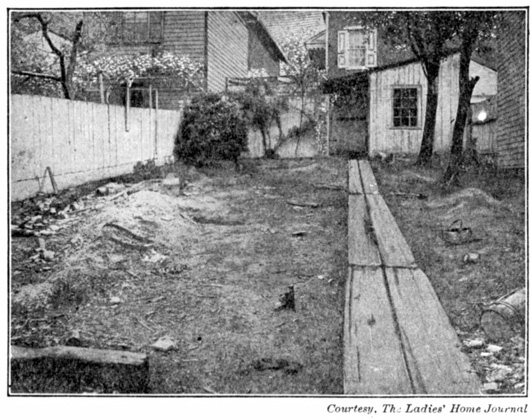
WOULD YOU RATHER HAVE A BACK YARD LIKE THIS?
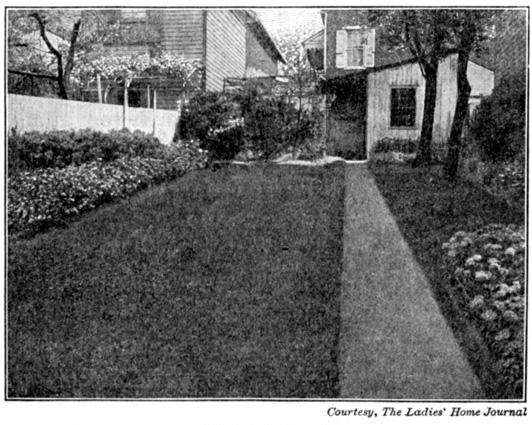
OR LIKE THIS?
There is one great evil that for hundreds and hundreds of years has been known wherever people are crowded together, and even in the open country, too; and which has been the cause of more untidiness and uncleanliness and unhappiness 152and disease than any other evil ever known. And that is the drinking of alcohol. People don’t drink clear alcohol, but they can get a great deal of it—enough to poison them badly—in the fermented drinks you learned about some time ago.
In the days when your grandfather was a little boy, every man thought that ale and wine and whiskey were good foods for him when he was well; and good medicine when he was sick. He believed that they gave him an appetite, and increased his strength. But now we have found, by carefully studying the effects of alcohol, in laboratories and in hospitals, that these beliefs were almost entirely mistaken. We know that all that wine, beer, and whiskey do is to make people feel better for a little while, without making them actually stronger or better in any way. In fact, in most respects these drinks make them weaker and worse instead.
Perhaps you will ask, “How do whiskey and wine and beer do us harm?” And here is only part of the answer: (1) They tire the heart and, by enlarging the blood pipes in the skin, make the heart pump too much of the blood out to the skin. In this way they make a person feel warmer when he really is not any warmer. (2) They make the liver work too hard. (3) They dull the 153brain, so that it cannot think so clearly or so well. (4) If one drinks them frequently, it is harder for him to get well when he is sick; more people die out of those who drink alcohol than out of those who do not.
Alcohol is a narcotic; that is, it deadens our nerves, for the time being, to any sensations of pain or discomfort, much in the same way that a very small dose of morphine or opium would. We may imagine it does us good because, for a little while after drinking it, we may cease to feel pain or fatigue or cold; but, instead of making us really better and able to do more work, it is dulling our nerves so that we work more slowly and more clumsily. Men who have carefully measured the amount of work that they do have found that they do less work on days when they take one or two glasses of beer or wine than they do on days when they drink only water.
The great insurance companies have found that those of their policy holders who drink no alcohol at all live nearly one fourth longer and have nearly one third fewer sicknesses than those who drink alcohol even in moderate amounts.
Indeed, so strong is the evidence as to the bad effects of alcohol, and so steadily is it increasing, that it will probably not be very many years 154more before the drinking of wine or beer by intelligent, thoughtful people will have become less than half as common as it is now.
Strong, healthy men may be able for a long time to drink small amounts of liquor without noticing any harmful effects; but all the time the alcohol may be doing serious harm to their nerves and brain and kidneys and liver and blood vessels, which they will not find out until it is too late to stop the trouble.
Useless and bad as alcohol is for full-grown men and women, it is even worse for young and growing children; and no child, and no boy or girl under the age of twenty-one, should ever touch a drop of it, except in those rare instances where it may be prescribed as a medicine by a doctor, just as many other drugs are, which in larger doses would be poisons.
Fortunately, it will be no trouble for you children to let it alone entirely; for not one of you would like the taste of it the first time—or, indeed, for the matter of that, for the first ten or twelve times—that you tried to drink it, if you should be so foolish. This is one striking difference between alcohol and all other foods and drinks. Children have absolutely no natural liking, or taste, for the drinks that contain it, as 155they have for meat, milk, sugar, apples, and the other real foods. This is Nature’s way of telling them that it is not a real food, and not needed in any way for their growth and health. Let it alone absolutely, until you are at least twenty-one years old; and by that time you will probably have become so convinced of the harm that it is doing that you will never begin using it at all.
What we have been saying so far applies, of course, only to the moderate use of alcohol. How terrible the effects of the long or excessive use of alcohol are, you don’t need to learn from a book. All you have to do is to keep your eyes open on the streets, and see the drunken men reeling along the sidewalk, and the wrecks of men that hang around the saloons. The poorhouses and the jails and the insane asylums are filled with them. The most terrible thing that can happen to anyone is to become a drunkard. The best and safest and only sensible thing to do is to keep away from the only stuff that makes drunkards. It may do you the most terrible harm, and it cannot do you the slightest good.
Your city can never become the “City Beautiful” so long as this evil mars it; and, as you grow up, I hope you will do all you can toward making the right kind of city and home.
When you have had some good games of play after school, and have finished whatever errands you may have to run, or have done the chores about the barn or the garden or the house, you will begin to feel as if there were something missing somewhere. It won’t take you very long to discover where that missing feeling is; and when you hear a call from the house, or a ring of the bell in the hall, you come running in for supper. If you have worked well in school and played hard and done your chores well, you will have a splendid appetite. In fact, you will think there is no other meal in the day that tastes quite so good.
Is your evening meal supper or dinner? If you have had a hot dinner at noon, you probably do not want anything more than a good supper. But if you had only luncheon, then you are ready to eat something hot and hearty about six o’clock.
What are some of the things that you like for dinner? Meat and eggs and bread and butter and jam and rice and potatoes and onions and celery and cookies and apples and oranges and oh, so many, many other things! Mother Nature 157has given us all these good things, that we may have not only enough to eat but plenty of different kinds. We soon grow tired of one kind, and that is how she tells us that we need many kinds.
When I was little, oranges were not so common as they are now; and I never but once had as many as I wanted. That once, my father told me to eat all I liked, and I did; but for weeks afterwards I didn’t want even to see an orange! Did you ever feel that way too, though perhaps not about oranges? Nature sometimes has to teach us not to eat too much of one kind at a time.
Some people like one thing, and some another. Do all of you like onions? I think not; but those who do, like them very much. The same thing is true of tomatoes and sweet potatoes and red raspberries and oysters and many other things. But there are some things that almost everybody likes; and our grandfathers and great-grandfathers and great-great-grandfathers ate them. One of them is called the “staff of life” because we lean, or depend, on it so much; we have it for breakfast, dinner, and supper. That is bread, of course. Meat and eggs and milk and butter, too, are among the foods that we all like.
These might be called our “main foods,” and we should eat one or two or even three of them 158at each meal. Meat and milk and eggs and butter, animals give us. But these are not enough; we need besides some of the foods that plants give us, because, as I have told you, we need different kinds of food at one time to keep the body fires going briskly.
What are some of the foods that plants give us? Bread is made from a plant—from wheat. Oatmeal comes from the oat plant; and hominy, from corn. Some of our plant foods, such as potatoes, turnips, onions, sweet potatoes, parsnips, and radishes, grow under ground. Some, such as peas and beans, grow on vines. Then there are lettuce and cabbage and celery. And there are fruits—cherries, apples, peaches, plums, pears, melons, tomatoes, berries.
Nature has given us all these foods, and many more; and she wants us to use them all. She wants us to use, every day and every meal, some foods that come from plants and some that come from animals.
A good dinner would be a slice of roast beef or mutton, a potato, a helping of some sort of vegetable like peas or beans or onions or tomatoes or celery; and a dish of milk pudding or apple dumpling, or stewed fruit with bread and butter, or pie that has only an upper crust or its under 159crust very well baked. When you are eating bread, remember that the crusts are the very best part, because they are well cooked and really taste the best. They are good for your teeth, too.
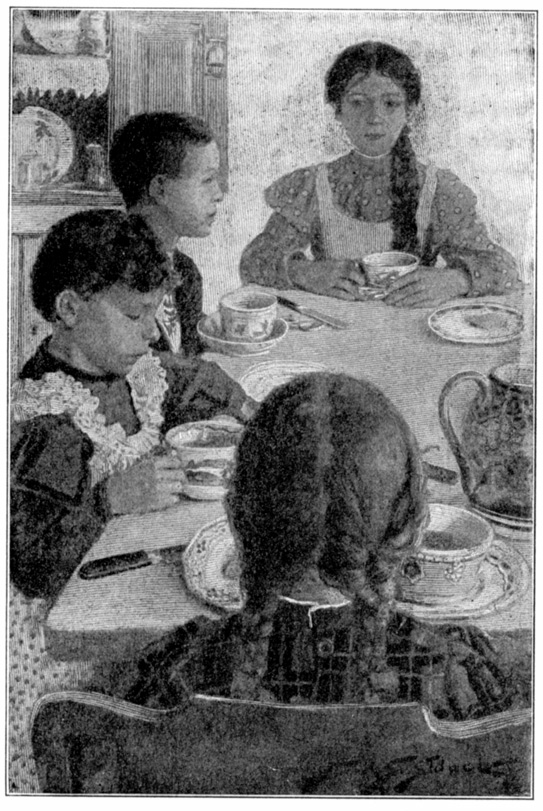
ONE OF THE HAPPIEST TIMES OF THE DAY
Perhaps, while I am talking about a good meal, I ought to talk a little about the way to eat and how to make mealtime pleasant.
Of course, to make our food soft, we must take little bites, eat slowly, and chew each mouthful a long time. Be sure to remember this. So many of the children I know eat so fast that you’d think they had to catch a train! Did you ever see anyone try to talk and chew at the same time or forget to shut his mouth while he was chewing? Wasn’t it a very awkward, disagreeable sight? Think a moment, if you are tempted to talk with your mouth full, or put your knife into your mouth, or make a noise while you are eating, that these things are not pleasant for your neighbors.
Do you tell funny stories at the table and talk about happy tramps you have taken or games you have played, or about your pets or your books? If you do, your food will do you more good, and you will be helping the other people at the table, too. Mealtimes should be the happiest times in the day.
When the supper things have been cleared away, you have two hours or so before going to bed, and I dare say you look forward to these as one of the pleasantest parts of the day.
It is always best for you to take things rather easily and quietly and pleasantly for at least fifteen or twenty minutes after every meal; and after the heaviest meal of the day, whether this comes at noon or in the evening, it is better to stretch the time to half or three quarters of an hour. If you try to work or play hard right after a hearty meal, you will be drawing away to your brain or to your muscles, the blood that the stomach is trying to get for the digesting and melting of your food. I suppose that you have all found this out for yourselves; for, if you run and play too hard right after dinner, you are very soon out of breath, and if you keep up the exercise, you are quite likely to have an attack of indigestion or stomach ache. If you sit down to study directly after a meal, you soon feel heavy and lazy, and what you read doesn’t seem clear to you, and in a little while you probably have 162a headache and an unpleasant taste in your mouth. If you try to do two important things like digestion and hard work with your brain or the muscles of your arms and legs at the same time, you will be very likely to do both of them badly.
Even if you have studying to do at night, it will be much better for you to spend half an hour or an hour in laughing and chatting, or in reading some good story, or in playing some of the many pleasant parlor games that rest you instead of tiring you, before you settle down to your books. You will find that when you do start to work, you get your lessons much more quickly and easily than if you had started in after eating.
Perhaps your sister is just waiting to show you that girls can play checkers better than boys can—“So there!” Or some of your friends have come in for a game of dominoes or authors or snap or parcheesi or stage coach or pussy-wants-a-corner, or to try that new song you learned last week; and you will be surprised how quickly the time flies away and bedtime or study hour comes.
Most evenings, however, you will probably get out your favorite magazine, or that good story that you are reading, and you will all sit 163around the big lamp on the center table and go off on adventures to the uttermost parts of the earth, with the best and most lasting friends that you will ever make—friends who will never grow tired of you and will always come when you want them and are always willing to talk or play—the people that live in books. Be sure to pick out the best of them for your chums—the bravest and the kindest and the most courteous, and the cleanest and the most honorable. You have the whole world to choose from; and it is never worth your while to get acquainted with cheap, badly behaved, second-rate people when you can have your pick of the best. Your mother and your father and your teacher will help you to choose, and you will soon find that what they call “good literature” is good stories, and about the right sort of men and women and boys and girls—the kind that you would like to know, and that you would want to be like. Once try it, and you find that you like that kind of reading better than you do the cheap, slangy, trashy stuff, just as you like, and never get tired of, good bread and butter and roast beef and apples and milk and cream and pudding and pie. Good sound stories of home life and adventure and travel are just as important in making 164your minds wholesome and happy as these good foods are in keeping your bodies strong and healthy.
Be sure that the paper of the books and magazines you read is white and not glossy, and is fairly thick and firm; for this makes them much easier to read and strains your eyes less. See, too, that the type is large and clear; for small, close type and yellow or shiny paper are very hard on the eyes.
Be sure, of course, when you sit down to read not to sit with your face to the lamp and your head bending forward; but settle yourself in a comfortable chair with your back to the light, and hold your book so that you can keep your chin up and your head erect while you read. You can breathe better, and read better, and enjoy what you read better in this position than in any other.
Even if you have sums or writing to do, it is better to sit with your back, or at least your left side, toward the light; and often you will find it a great help to sit down with your back to the light in a large easy chair and do your writing on a big, thin book, or light piece of board, on a cushion on your knee.
In winter, you will find that for the first half 165hour or so that you are reading after supper, you will want to keep fairly near the fire, because the blood is being drawn in from your skin to your stomach for purposes of digestion; but be sure to see that at least one, and better two, windows in the room are open six inches or so at the top, so that there is plenty of fresh air pouring into the room.
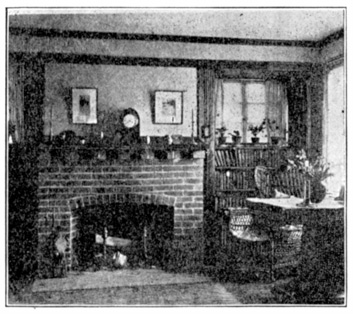
A COZY NOOK WHEN EVENING COMES
When study hour comes, take up your books and go briskly to work, forgetting that there is anything else in the world, and you will be astonished how quickly you will learn your lessons. Besides, you will be learning one of the most valuable lessons in life—to do with your might whatever your hands, or minds, find to do.
By and by the clock strikes eight or nine, and your mother says, “Children, time to go to bed!”
Sometimes you will have just come to the interesting point in the story, and would give anything to go on and finish it. But often you will be just nodding over your book, or beginning to wonder why the story is not quite so interesting as it was, or why the lines seem to be running into one another, and the book inclined to swing up and bump your nose.
If you have had a lively, busy, happy day, you are quite sleepy enough to be ready for bed—that is, if you could drop into it with all your clothes on, without all the bother and fuss of undressing. So you pull yourself together bravely and answer, “All right, mother,” and say “Good night” to everybody, and upstairs you go.
Of course, you must take off your clothes, because you would find them most uncomfortable to sleep in. Besides, the little pores all over your skin have been pouring out perspiration all day long; and a great deal of this has been 167caught by your clothes, just as it is caught by the bedclothes while you sleep.
So it is a good thing to take off your clothes, and let your skin be well aired and cooled. Don’t leave your clothes all in a heap on the floor just where you happen to shed them, but hang them up over the back of a chair or on pegs, so that the air can blow through them all night long and sweeten and clean and dry them. Clothes that are worn continuously become sour with perspiration, and for this same reason your mother gives you regularly, once or twice a week, clean underwear and clean shirts or dresses.
After you have undressed for bed, wash your face and neck and hands; and if you have a nice warm room or bathroom, take a quick splash, or sponge bath, all over, before you put on your nightgown. This will wash away from your skin everything that the perspiration has been leaving on it all day long, as well as any dust, or dirt, that may have got on it during the day.
If the room is not warm enough for you to do this, it is a good thing for you to strip to your waist and then to swing your arms about, much as you did in the morning, only not quite so long, and to rub your arms and neck and shoulders all over with your hands. This gives them an 168air bath, and rubs off any of the little scales of skin that may be ready to be shed, and gives you a sort of dry wash, which is next best to a wet one.
Then, when you have put on your nightdress, give your hair a thorough brushing. This is the best time of the day to do it. Dust, smoke, soot, and germs have been blowing into your hair all day long, and a thoroughly good brushing will not only get these out of it before they have had time to work their way in and lodge on the scalp, but will keep the hair bright and healthy.
Before you get into bed, give your nails a quick scrub with a nail brush and hot water and soap, and go over them with a blunt-pointed nail cleaner, cleaning out any dirt that may be under their edges, and rounding off any ragged or broken points with the file. Once a week or so, when you take your hot bath, it is a good thing to go over your toe nails in the same way, trimming them and cleaning them. Remember, however, not to round off your toe nails at the corners, but to leave them square, as in this way you will prevent them from ingrowing under the pressure of your shoes.
There is one thing that you should be very sure of before you get into bed, and that is that 169your teeth are as clean as it is possible for you to make them. If you attended to this also directly after supper, so much the better; for just as it is important to clean the dishes and knives and forks that you have been using, so it is important to thoroughly clean the ivory knives and forks that grow in your mouth. Talk about being “born with a silver spoon in your mouth”! You were born with something much prettier and far more valuable.
Even though your teeth make a firm and even line in front and on their cutting edges, yet there are many little gaps and spaces between their roots, where bits of food can stick. If these scraps of food are not thoroughly and carefully removed after each meal, the warmth and moisture in the mouth makes them begin to decay. The acids from this decay will be likely not only to upset your stomach and digestion, but to act upon the glassy coating of your teeth. After a little while, spots will begin to form on the surface of your teeth; they will lose their bright, shiny, pearly look; the acids will eat further into the teeth, and very soon there will be holes, or cavities.
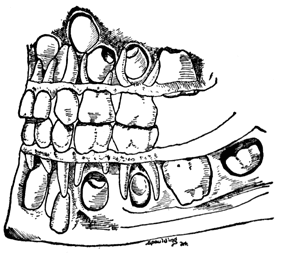
HEALTHY GUMS MEAN HEALTHY TEETH
If the gums are not kept clean and healthy, the second teeth that are getting ready to push out the first teeth will not come in strong and good, nor will the teeth remain good. This picture shows how the teeth grow. Notice the gaps between the teeth, where food may lodge.
Though your teeth are very hard and glassy looking on the surface, they are much softer and chalkier inside; this glassy coating covers only 170the crown, or free part, of the tooth, which you can see. It leaves the softer inside part of the tooth bare just at the edge of the gums, and particularly between the roots of the teeth, where little scraps of food lodge and decay. When the acids that are formed by the decaying food have eaten away a good deal of the inside of the tooth, the hard, shiny surface is left just like a thin shell; and one day you happen to bite down upon a piece of bone in your food, or try to crack a nut with your teeth, and “crack” goes this brittle shell of your hollow tooth.
Right in the middle of each tooth is a tiny hollow, or cavity, filled with a soft, living pulp containing one or two very sensitive nerves; and when the decay has eaten into the tooth far enough to reach this nerve pulp, it makes it ache, and then you have toothache.
The one and only thing that is necessary in 171order to avoid all this decay and breaking away of your teeth, and throbbing toothache, is to keep the surface of your teeth, and particularly the sides where they are next one another, clean and smooth and unbroken. And all that is needed to keep your teeth perfectly clean and smooth is to use your toothbrush thoroughly after every meal and at bedtime; and then, if there are any little scraps of food between the teeth that have not been brushed away, to pick them out gently with a quill toothpick, or take a piece of silk or linen thread, push it up between the teeth, and gently saw backward and forward until you have cleaned out the space between the roots. You should take at least three to five minutes after every meal and before you go to bed at night to brush your teeth; and you should brush not only your teeth, but the whole surface of your gums close up to where they join the lips.
It is almost as important to keep your gums pink and hard and healthy as it is to keep your teeth clean; and the same thorough brushing will do both. If the gums are perfectly healthy, they will come well down over the roots of the teeth, and keep them safely covered right down to where the glassy outer coating begins, and so leave no gap where the acids of decay can attack 172the teeth. Be sure to brush your teeth, not merely straight backward and forward, but up and down and round and round as well, both to clean out thoroughly all the grooves and openings between them and to brush the gums well down over the teeth.
It may seem strange, but one of the best ways to keep your teeth from growing crooked and irregular is to keep your nose clear and healthy, so that you can breathe through it freely at all times, both day and night. Crooked jaws and irregular teeth are more often caused by mouth breathing than by any other one thing.
You can see why it is best to be careful not to get grit or dirt or bits of bone in your food, and not to crack nuts or hard candy with your teeth. If you do, you may crack or scratch the delicate glassy coating of your teeth. But, on the other hand, it is a good thing to give the teeth plenty to do, and particularly to eat the crusts of bread, and some of the tougher parts of meat, and parched corn or other grains, and to eat celery, apples, and other foods that take a great deal of chewing. The teeth are like everything else in the body—they need plenty of vigorous work in order to keep them healthy.
Be very careful, though, to keep out of your 173mouth anything that might possibly crack or scratch the glassy coating, such as pins, pennies, pieces of wire, or slate pencils. It is best not even to try to bite off threads or pieces of string. There is, of course, another reason for not putting pencils and pennies and such things into your mouth: they may have dirt, or germs, on them and infect you with disease or at least upset your digestion.
Now you are all ready for bed; and the white pillow and the nice, clean sheets and the warm blankets look very good to you, and you are ready to go to the “Land of Nod.”
You need not be afraid of the cold at night. Open your bedroom windows. Have plenty of light-weight, warm covers; then the cold breezes won’t hurt you, but will make you strong. Just think how many hours you are in bed,—nearly half of your life,—and you need fresh, moving air all the time. Be sure to open your windows from the top as well as from the bottom. You know why: your breath is warm so that it floats and rises like smoke; and if you open the window only at the bottom, this bad air, which rises to the top of the room, can’t get out. It is best to 174have windows on two sides of a bedroom, so that the air can be kept moving through it all night long. If you don’t breathe fresh air while you sleep, you will feel dull and stupid in the morning and perhaps have a headache.
So run your window shades right up to the top and throw your curtains, or shutters, back, as well as open the windows. If you don’t, the fresh air cannot blow through the room properly. Even if this does let more light or noise into the room, this is of no importance whatever compared with abundance of fresh air. If you have played long enough out of doors in the daytime and have eaten a good supper and not stayed up too late, you will sleep soundly without being bothered at all by either lights or noises coming in through the windows. And no matter how cold or how light it is, don’t put your head under the bedclothes. Why?
It is best for you to close your mouth while you are going to sleep, and breathe through your nose, so that the air will be properly purified and warmed before it reaches your lungs. If you can’t do this, your mother can perhaps give you something to wash out your nose, so that you can breathe freely. If that does not help, you had better see a doctor, and he will find some way 175to clear your head so that you can use your nose comfortably.
Suppose you take a pencil and paper and write down all you did yesterday. Wasn’t it enough to make you tired and sleepy and want a chance to rest? Even while you sleep, your heart keeps beating, and you don’t stop breathing, of course. But your muscles are quiet, and your food tube rests. Your brain rests, too,—better in sleep than at any other time,—so that when morning comes you are as “lively as a cricket” and quite ready for the new day.
Yet even in sleep your brain does not stop working entirely, but goes on receiving messages from the stomach and the skin and the memory, and mixing them up together in the strangest fashion, so that you dream, as you say. You ought not to dream very much if you are perfectly well; but as long as your dreams are pleasant or amusing, you need not pay any attention to them. But if you have had bad dreams, or you dream so hard all night long that you don’t feel rested in the morning, then you had better speak to your mother about it, and let her see what is the matter with your digestion or your nerves, or take you to a doctor. Bad dreams are always a sign of ill health and are a very disagreeable 176thing, from which there is no need that you should suffer any more than from headache or indigestion or colic. Dreams, of course, do not mean or foretell anything whatever, except simply how bad, or good, the state of your digestion and your nerves is.
Now, how much time should you spend in bed? Well, I think at your age nearly half the time. Ten or eleven hours of sleep make you ready for all the hours of work and play, and you don’t become cross and tired half so easily if you have plenty of sleep. Though you are lying so quietly, you are not by any means wasting your time, for you probably are growing faster when you are asleep than when awake. Babies, who are growing very fast, you know, sleep nearly all the time.
So after you have opened all the windows wide, put out the light and jump into bed and lie down for a good night’s rest without thinking about anything except how comfortable the bed feels when you are tired.
End of the Project Gutenberg EBook of The Child's Day, by Woods Hutchinson
*** END OF THIS PROJECT GUTENBERG EBOOK THE CHILD'S DAY ***
***** This file should be named 18559-h.htm or 18559-h.zip *****
This and all associated files of various formats will be found in:
http://www.gutenberg.org/1/8/5/5/18559/
Produced by Barbara Tozier, Bill Tozier and the Online
Distributed Proofreading Team at http://www.pgdp.net
Updated editions will replace the previous one--the old editions
will be renamed.
Creating the works from public domain print editions means that no
one owns a United States copyright in these works, so the Foundation
(and you!) can copy and distribute it in the United States without
permission and without paying copyright royalties. Special rules,
set forth in the General Terms of Use part of this license, apply to
copying and distributing Project Gutenberg-tm electronic works to
protect the PROJECT GUTENBERG-tm concept and trademark. Project
Gutenberg is a registered trademark, and may not be used if you
charge for the eBooks, unless you receive specific permission. If you
do not charge anything for copies of this eBook, complying with the
rules is very easy. You may use this eBook for nearly any purpose
such as creation of derivative works, reports, performances and
research. They may be modified and printed and given away--you may do
practically ANYTHING with public domain eBooks. Redistribution is
subject to the trademark license, especially commercial
redistribution.
*** START: FULL LICENSE ***
THE FULL PROJECT GUTENBERG LICENSE
PLEASE READ THIS BEFORE YOU DISTRIBUTE OR USE THIS WORK
To protect the Project Gutenberg-tm mission of promoting the free
distribution of electronic works, by using or distributing this work
(or any other work associated in any way with the phrase "Project
Gutenberg"), you agree to comply with all the terms of the Full Project
Gutenberg-tm License (available with this file or online at
http://gutenberg.org/license).
Section 1. General Terms of Use and Redistributing Project Gutenberg-tm
electronic works
1.A. By reading or using any part of this Project Gutenberg-tm
electronic work, you indicate that you have read, understand, agree to
and accept all the terms of this license and intellectual property
(trademark/copyright) agreement. If you do not agree to abide by all
the terms of this agreement, you must cease using and return or destroy
all copies of Project Gutenberg-tm electronic works in your possession.
If you paid a fee for obtaining a copy of or access to a Project
Gutenberg-tm electronic work and you do not agree to be bound by the
terms of this agreement, you may obtain a refund from the person or
entity to whom you paid the fee as set forth in paragraph 1.E.8.
1.B. "Project Gutenberg" is a registered trademark. It may only be
used on or associated in any way with an electronic work by people who
agree to be bound by the terms of this agreement. There are a few
things that you can do with most Project Gutenberg-tm electronic works
even without complying with the full terms of this agreement. See
paragraph 1.C below. There are a lot of things you can do with Project
Gutenberg-tm electronic works if you follow the terms of this agreement
and help preserve free future access to Project Gutenberg-tm electronic
works. See paragraph 1.E below.
1.C. The Project Gutenberg Literary Archive Foundation ("the Foundation"
or PGLAF), owns a compilation copyright in the collection of Project
Gutenberg-tm electronic works. Nearly all the individual works in the
collection are in the public domain in the United States. If an
individual work is in the public domain in the United States and you are
located in the United States, we do not claim a right to prevent you from
copying, distributing, performing, displaying or creating derivative
works based on the work as long as all references to Project Gutenberg
are removed. Of course, we hope that you will support the Project
Gutenberg-tm mission of promoting free access to electronic works by
freely sharing Project Gutenberg-tm works in compliance with the terms of
this agreement for keeping the Project Gutenberg-tm name associated with
the work. You can easily comply with the terms of this agreement by
keeping this work in the same format with its attached full Project
Gutenberg-tm License when you share it without charge with others.
1.D. The copyright laws of the place where you are located also govern
what you can do with this work. Copyright laws in most countries are in
a constant state of change. If you are outside the United States, check
the laws of your country in addition to the terms of this agreement
before downloading, copying, displaying, performing, distributing or
creating derivative works based on this work or any other Project
Gutenberg-tm work. The Foundation makes no representations concerning
the copyright status of any work in any country outside the United
States.
1.E. Unless you have removed all references to Project Gutenberg:
1.E.1. The following sentence, with active links to, or other immediate
access to, the full Project Gutenberg-tm License must appear prominently
whenever any copy of a Project Gutenberg-tm work (any work on which the
phrase "Project Gutenberg" appears, or with which the phrase "Project
Gutenberg" is associated) is accessed, displayed, performed, viewed,
copied or distributed:
This eBook is for the use of anyone anywhere at no cost and with
almost no restrictions whatsoever. You may copy it, give it away or
re-use it under the terms of the Project Gutenberg License included
with this eBook or online at www.gutenberg.org
1.E.2. If an individual Project Gutenberg-tm electronic work is derived
from the public domain (does not contain a notice indicating that it is
posted with permission of the copyright holder), the work can be copied
and distributed to anyone in the United States without paying any fees
or charges. If you are redistributing or providing access to a work
with the phrase "Project Gutenberg" associated with or appearing on the
work, you must comply either with the requirements of paragraphs 1.E.1
through 1.E.7 or obtain permission for the use of the work and the
Project Gutenberg-tm trademark as set forth in paragraphs 1.E.8 or
1.E.9.
1.E.3. If an individual Project Gutenberg-tm electronic work is posted
with the permission of the copyright holder, your use and distribution
must comply with both paragraphs 1.E.1 through 1.E.7 and any additional
terms imposed by the copyright holder. Additional terms will be linked
to the Project Gutenberg-tm License for all works posted with the
permission of the copyright holder found at the beginning of this work.
1.E.4. Do not unlink or detach or remove the full Project Gutenberg-tm
License terms from this work, or any files containing a part of this
work or any other work associated with Project Gutenberg-tm.
1.E.5. Do not copy, display, perform, distribute or redistribute this
electronic work, or any part of this electronic work, without
prominently displaying the sentence set forth in paragraph 1.E.1 with
active links or immediate access to the full terms of the Project
Gutenberg-tm License.
1.E.6. You may convert to and distribute this work in any binary,
compressed, marked up, nonproprietary or proprietary form, including any
word processing or hypertext form. However, if you provide access to or
distribute copies of a Project Gutenberg-tm work in a format other than
"Plain Vanilla ASCII" or other format used in the official version
posted on the official Project Gutenberg-tm web site (www.gutenberg.org),
you must, at no additional cost, fee or expense to the user, provide a
copy, a means of exporting a copy, or a means of obtaining a copy upon
request, of the work in its original "Plain Vanilla ASCII" or other
form. Any alternate format must include the full Project Gutenberg-tm
License as specified in paragraph 1.E.1.
1.E.7. Do not charge a fee for access to, viewing, displaying,
performing, copying or distributing any Project Gutenberg-tm works
unless you comply with paragraph 1.E.8 or 1.E.9.
1.E.8. You may charge a reasonable fee for copies of or providing
access to or distributing Project Gutenberg-tm electronic works provided
that
- You pay a royalty fee of 20% of the gross profits you derive from
the use of Project Gutenberg-tm works calculated using the method
you already use to calculate your applicable taxes. The fee is
owed to the owner of the Project Gutenberg-tm trademark, but he
has agreed to donate royalties under this paragraph to the
Project Gutenberg Literary Archive Foundation. Royalty payments
must be paid within 60 days following each date on which you
prepare (or are legally required to prepare) your periodic tax
returns. Royalty payments should be clearly marked as such and
sent to the Project Gutenberg Literary Archive Foundation at the
address specified in Section 4, "Information about donations to
the Project Gutenberg Literary Archive Foundation."
- You provide a full refund of any money paid by a user who notifies
you in writing (or by e-mail) within 30 days of receipt that s/he
does not agree to the terms of the full Project Gutenberg-tm
License. You must require such a user to return or
destroy all copies of the works possessed in a physical medium
and discontinue all use of and all access to other copies of
Project Gutenberg-tm works.
- You provide, in accordance with paragraph 1.F.3, a full refund of any
money paid for a work or a replacement copy, if a defect in the
electronic work is discovered and reported to you within 90 days
of receipt of the work.
- You comply with all other terms of this agreement for free
distribution of Project Gutenberg-tm works.
1.E.9. If you wish to charge a fee or distribute a Project Gutenberg-tm
electronic work or group of works on different terms than are set
forth in this agreement, you must obtain permission in writing from
both the Project Gutenberg Literary Archive Foundation and Michael
Hart, the owner of the Project Gutenberg-tm trademark. Contact the
Foundation as set forth in Section 3 below.
1.F.
1.F.1. Project Gutenberg volunteers and employees expend considerable
effort to identify, do copyright research on, transcribe and proofread
public domain works in creating the Project Gutenberg-tm
collection. Despite these efforts, Project Gutenberg-tm electronic
works, and the medium on which they may be stored, may contain
"Defects," such as, but not limited to, incomplete, inaccurate or
corrupt data, transcription errors, a copyright or other intellectual
property infringement, a defective or damaged disk or other medium, a
computer virus, or computer codes that damage or cannot be read by
your equipment.
1.F.2. LIMITED WARRANTY, DISCLAIMER OF DAMAGES - Except for the "Right
of Replacement or Refund" described in paragraph 1.F.3, the Project
Gutenberg Literary Archive Foundation, the owner of the Project
Gutenberg-tm trademark, and any other party distributing a Project
Gutenberg-tm electronic work under this agreement, disclaim all
liability to you for damages, costs and expenses, including legal
fees. YOU AGREE THAT YOU HAVE NO REMEDIES FOR NEGLIGENCE, STRICT
LIABILITY, BREACH OF WARRANTY OR BREACH OF CONTRACT EXCEPT THOSE
PROVIDED IN PARAGRAPH F3. YOU AGREE THAT THE FOUNDATION, THE
TRADEMARK OWNER, AND ANY DISTRIBUTOR UNDER THIS AGREEMENT WILL NOT BE
LIABLE TO YOU FOR ACTUAL, DIRECT, INDIRECT, CONSEQUENTIAL, PUNITIVE OR
INCIDENTAL DAMAGES EVEN IF YOU GIVE NOTICE OF THE POSSIBILITY OF SUCH
DAMAGE.
1.F.3. LIMITED RIGHT OF REPLACEMENT OR REFUND - If you discover a
defect in this electronic work within 90 days of receiving it, you can
receive a refund of the money (if any) you paid for it by sending a
written explanation to the person you received the work from. If you
received the work on a physical medium, you must return the medium with
your written explanation. The person or entity that provided you with
the defective work may elect to provide a replacement copy in lieu of a
refund. If you received the work electronically, the person or entity
providing it to you may choose to give you a second opportunity to
receive the work electronically in lieu of a refund. If the second copy
is also defective, you may demand a refund in writing without further
opportunities to fix the problem.
1.F.4. Except for the limited right of replacement or refund set forth
in paragraph 1.F.3, this work is provided to you 'AS-IS', WITH NO OTHER
WARRANTIES OF ANY KIND, EXPRESS OR IMPLIED, INCLUDING BUT NOT LIMITED TO
WARRANTIES OF MERCHANTIBILITY OR FITNESS FOR ANY PURPOSE.
1.F.5. Some states do not allow disclaimers of certain implied
warranties or the exclusion or limitation of certain types of damages.
If any disclaimer or limitation set forth in this agreement violates the
law of the state applicable to this agreement, the agreement shall be
interpreted to make the maximum disclaimer or limitation permitted by
the applicable state law. The invalidity or unenforceability of any
provision of this agreement shall not void the remaining provisions.
1.F.6. INDEMNITY - You agree to indemnify and hold the Foundation, the
trademark owner, any agent or employee of the Foundation, anyone
providing copies of Project Gutenberg-tm electronic works in accordance
with this agreement, and any volunteers associated with the production,
promotion and distribution of Project Gutenberg-tm electronic works,
harmless from all liability, costs and expenses, including legal fees,
that arise directly or indirectly from any of the following which you do
or cause to occur: (a) distribution of this or any Project Gutenberg-tm
work, (b) alteration, modification, or additions or deletions to any
Project Gutenberg-tm work, and (c) any Defect you cause.
Section 2. Information about the Mission of Project Gutenberg-tm
Project Gutenberg-tm is synonymous with the free distribution of
electronic works in formats readable by the widest variety of computers
including obsolete, old, middle-aged and new computers. It exists
because of the efforts of hundreds of volunteers and donations from
people in all walks of life.
Volunteers and financial support to provide volunteers with the
assistance they need, is critical to reaching Project Gutenberg-tm's
goals and ensuring that the Project Gutenberg-tm collection will
remain freely available for generations to come. In 2001, the Project
Gutenberg Literary Archive Foundation was created to provide a secure
and permanent future for Project Gutenberg-tm and future generations.
To learn more about the Project Gutenberg Literary Archive Foundation
and how your efforts and donations can help, see Sections 3 and 4
and the Foundation web page at http://www.pglaf.org.
Section 3. Information about the Project Gutenberg Literary Archive
Foundation
The Project Gutenberg Literary Archive Foundation is a non profit
501(c)(3) educational corporation organized under the laws of the
state of Mississippi and granted tax exempt status by the Internal
Revenue Service. The Foundation's EIN or federal tax identification
number is 64-6221541. Its 501(c)(3) letter is posted at
http://pglaf.org/fundraising. Contributions to the Project Gutenberg
Literary Archive Foundation are tax deductible to the full extent
permitted by U.S. federal laws and your state's laws.
The Foundation's principal office is located at 4557 Melan Dr. S.
Fairbanks, AK, 99712., but its volunteers and employees are scattered
throughout numerous locations. Its business office is located at
809 North 1500 West, Salt Lake City, UT 84116, (801) 596-1887, email
business@pglaf.org. Email contact links and up to date contact
information can be found at the Foundation's web site and official
page at http://pglaf.org
For additional contact information:
Dr. Gregory B. Newby
Chief Executive and Director
gbnewby@pglaf.org
Section 4. Information about Donations to the Project Gutenberg
Literary Archive Foundation
Project Gutenberg-tm depends upon and cannot survive without wide
spread public support and donations to carry out its mission of
increasing the number of public domain and licensed works that can be
freely distributed in machine readable form accessible by the widest
array of equipment including outdated equipment. Many small donations
($1 to $5,000) are particularly important to maintaining tax exempt
status with the IRS.
The Foundation is committed to complying with the laws regulating
charities and charitable donations in all 50 states of the United
States. Compliance requirements are not uniform and it takes a
considerable effort, much paperwork and many fees to meet and keep up
with these requirements. We do not solicit donations in locations
where we have not received written confirmation of compliance. To
SEND DONATIONS or determine the status of compliance for any
particular state visit http://pglaf.org
While we cannot and do not solicit contributions from states where we
have not met the solicitation requirements, we know of no prohibition
against accepting unsolicited donations from donors in such states who
approach us with offers to donate.
International donations are gratefully accepted, but we cannot make
any statements concerning tax treatment of donations received from
outside the United States. U.S. laws alone swamp our small staff.
Please check the Project Gutenberg Web pages for current donation
methods and addresses. Donations are accepted in a number of other
ways including checks, online payments and credit card
donations. To donate, please visit: http://pglaf.org/donate
Section 5. General Information About Project Gutenberg-tm electronic
works.
Professor Michael S. Hart is the originator of the Project Gutenberg-tm
concept of a library of electronic works that could be freely shared
with anyone. For thirty years, he produced and distributed Project
Gutenberg-tm eBooks with only a loose network of volunteer support.
Project Gutenberg-tm eBooks are often created from several printed
editions, all of which are confirmed as Public Domain in the U.S.
unless a copyright notice is included. Thus, we do not necessarily
keep eBooks in compliance with any particular paper edition.
Most people start at our Web site which has the main PG search facility:
http://www.gutenberg.org
This Web site includes information about Project Gutenberg-tm,
including how to make donations to the Project Gutenberg Literary
Archive Foundation, how to help produce our new eBooks, and how to
subscribe to our email newsletter to hear about new eBooks.
*** END: FULL LICENSE ***